CATALOGUE.

SESSION 1883-84.



SESSION 1883-84.

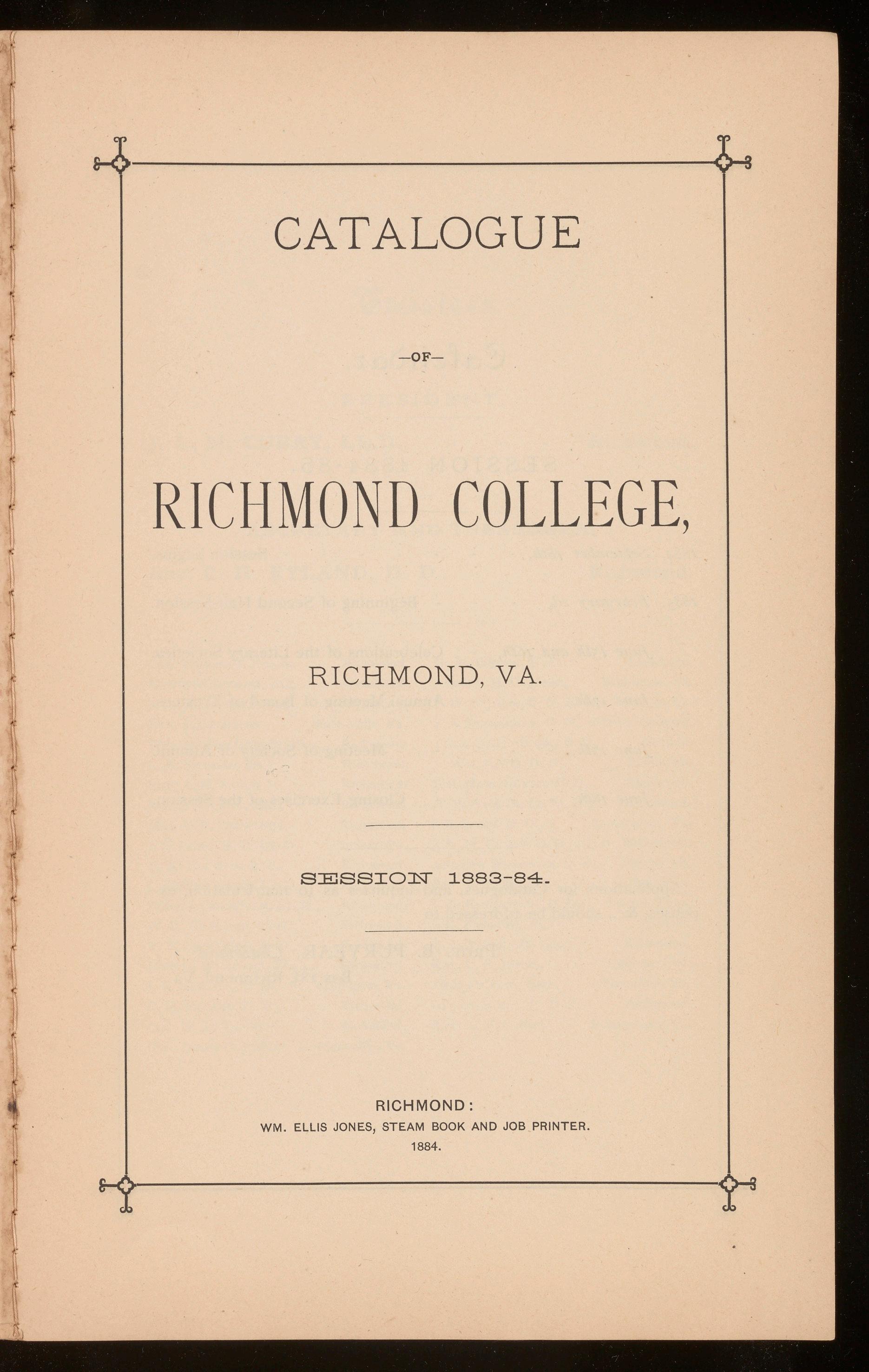
SESSION" 1883-84.
RICHMOND:
WM. ELLIS JONES, STEAM BOOK AND JOB PRINTER 1884.
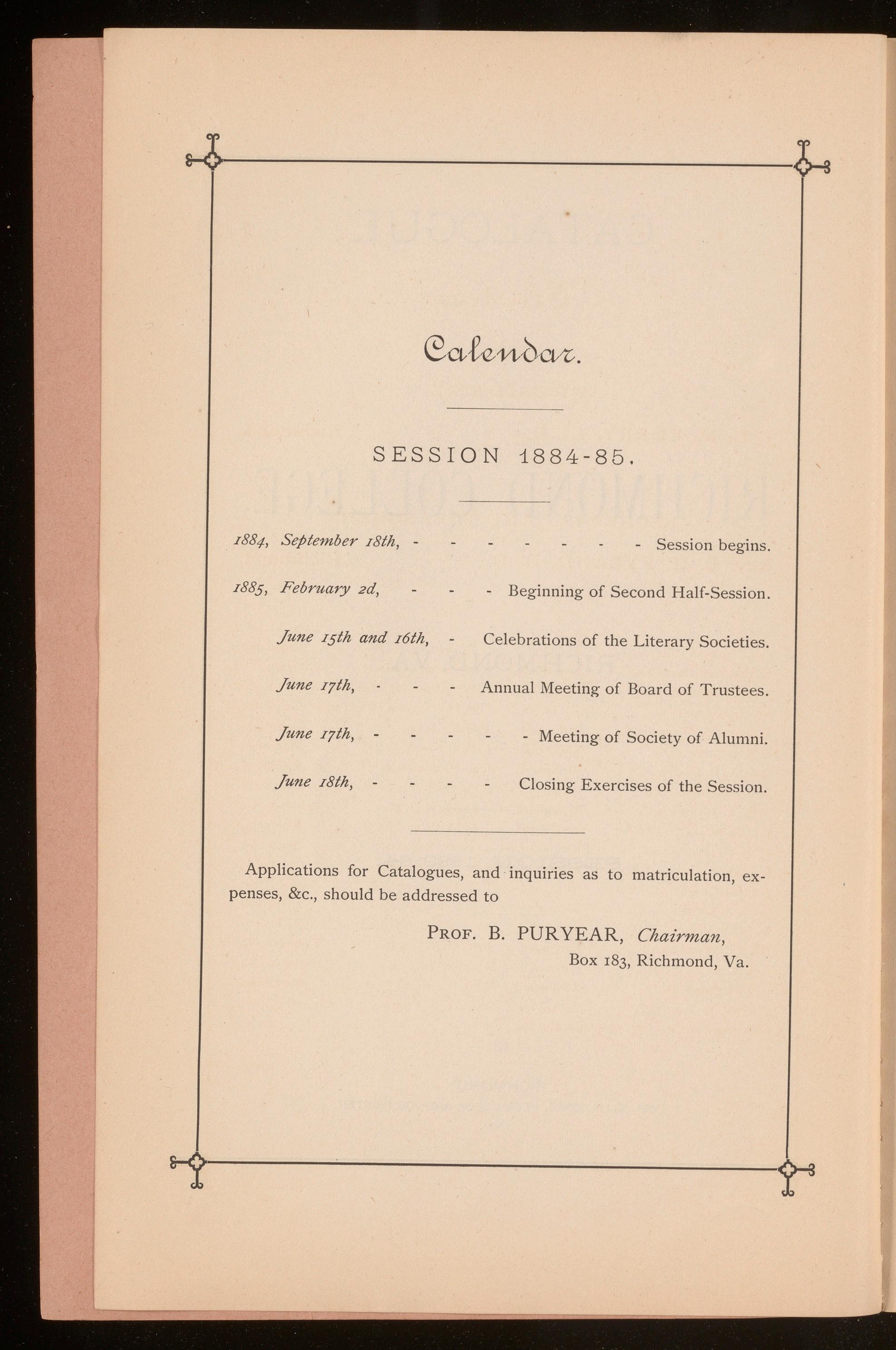
SESSION 1884-85.
I884, September I8th, - -Session begins.
I885, February 2d, -Beginning of Second Half-Session.
fime I5th and I6th, Celebrations of the Literary Societies.
June I7th, Annual Meeting of Board of Trustees.
June IJth, - -Meeting of Society of Alumni.
June I8th, - Closing Exercises of the Session.
Applications for Catalogues, and inquiries as to matriculation, ex- penses, &c., should be addressed to
PROF. B. PURYEAR, Chairman, Box 183, Richmond, Va.
PRESIDENT, J. T ,._,_ M . CURRY , LL.D. , Richmond.
Rev. C. H . RYLAND , D. D ., Richmond.
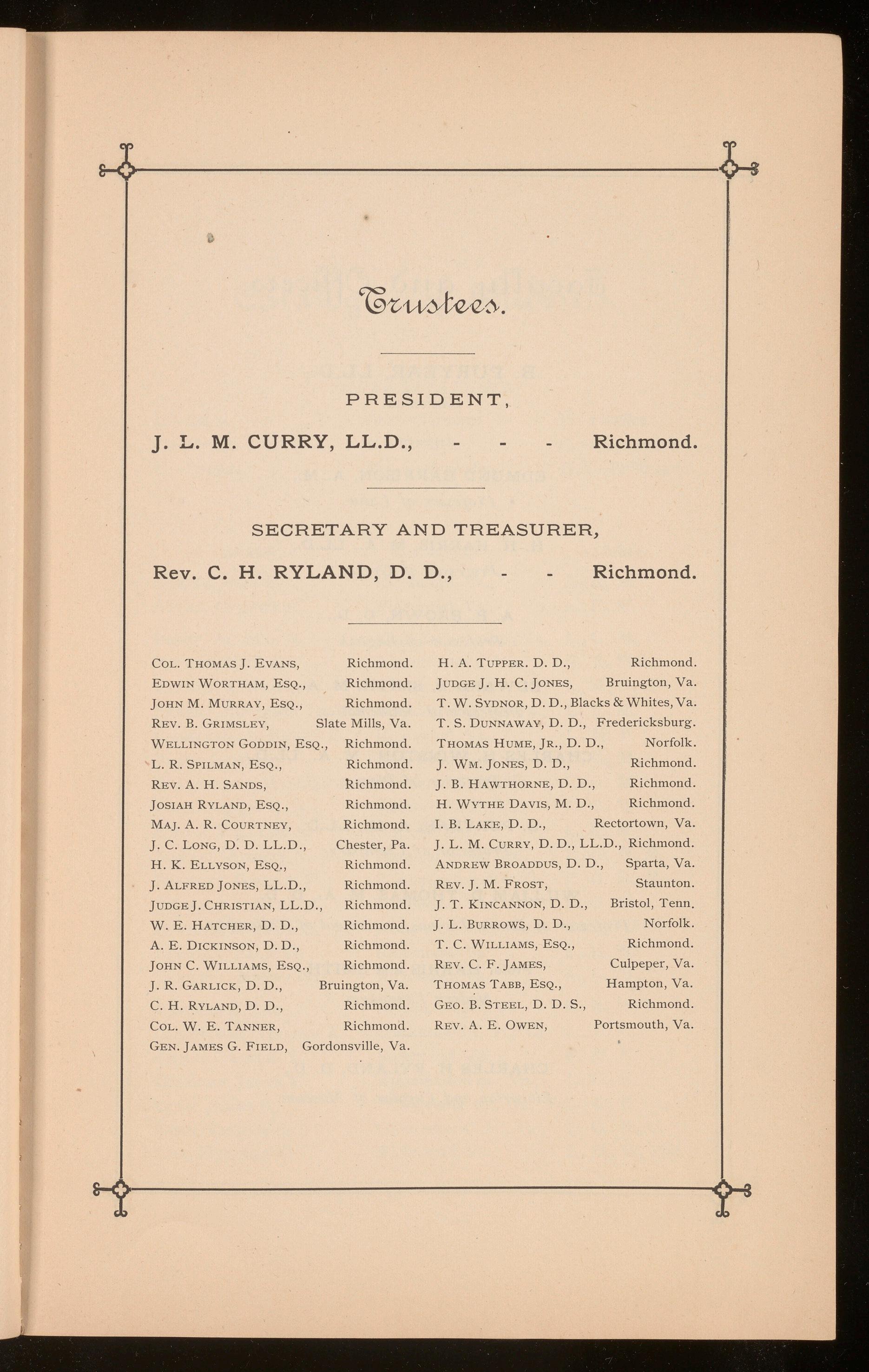
COL. THOMAS J. EVANS,
EDWIN WORTHAM, ESQ.,
JOHN M. MURRAY, ESQ ,
REV. B. GRIMSLEY, Richmond. Ric h mond. R ichmond.
H. A. TUPPER. D. D., Richmo n d.
JUDGE]. H. C.]ONES, Bruington, Va.
T W. SYDNOR,D. D., Blacks & Wh ites, Va.
Slate Mi lls, Va.
WELLINGTON GoDDIN, ESQ., Richmond
L. R. SPILMAN, ESQ., Richmond.
REV. A.H. SANDS,
J OSIAH RYLAND, ESQ.,
MAJ. A. R. COURTNEY,
T. S. DUNNAWAY,D. D., Frederic k sburg.
THOMAS HUME, J R., D. D., Norfolk.
J. WM. JONES, D. D., R ichmond.
] B. HAWTHORNE, D. D., Ric h mond.
H. WYTHE DAVIS, M. D., Richmond.
Richmo n d. Chester, Pa.
]. C. LONG, D. D LL.D., R ichmo n d Richmond.
H.K ELLYSON, EsQ , R ichmond.
J. ALFRED ] ONES, LL.D., Richmond.
JUDGE]. CHR ISTIAN, LL.D., Ric h mo n d.
W. E. HATCHER, D D., Richmo n d
A. E. DICKINSON, D D , Richmond.
JOHN C. W I LLIAMS, ESQ., Richmond.
]. R. GARLICK, D. D., C. H RYLAND, D. D , COL. w. E. TANNER,
Bruington, Va.
Ric h mond
Ric hmond .
GEN. JAMES G. FIELD, Gordo n svi lle, Va.
I. B. LAKE, D. D., Rec t ortown, Va.
J. L. M. CURRY, D. D., LL.D., Richmond.
ANDREW BROADDUS,D. D., Sparta, Va.
REV.]. M. FROST, Sta u nton
J T. KINCANNON, D. D , Bri st ol , Tenn.
J. L. BURROWS,D. D., Norfo lk.
T C. WILLIAMS, ESQ., R ic hm ond.
REV. C F. JAMES, C u lpeper, Va.
THOMAS 'f'ABB, ESQ., H ampton, Va.
GEO. B STEEL, D. D. S , Richmond.
REV. A. E. OWEN, Ports m outh, Va.

B. PURYEAR, LL.D., Chairman.
EDMUND HARRISON, A. M., Professor o.f Latin.
H. H. HARRIS, M. A., LL.D., Professor o.f Greek.
A. B. BROWN, D. D., Professor of English.
EDWARD B. SMITH, M. A., Professor o.f Mathematics.
CHARLES H. WINSTON., M. A., LL.D., Professor o.f Physics.
B. PURYEAR, A. M., LL.D., Professor o.f Chemistry.
WILLIAM D. THOMAS, M. A., D. D., Professor o.f James Thomas, Jr., School o.f Philosophy.
Profs. HARRIS and SMITH, Modern Languages
CHARLESH. RYLAND, D. D., Librarian and Curator o.f Museum.
L-Latin.
G.-Greek. F.-French.

ABBREVIATIONS.
Ger.-German. E.-English. M.-Mathematics.
P.-Physics. C.-Chemistry. Phil.-Philosophy.
NAMES.
ATKINS,JOHN P.
ATLEE, GEORGES.
BAGBY,ALFRED, JR.
BARKER,JOHN A.
BARNEY,J. STEWART
BARRET, BENJAMINT. BASKERVILLE,HENRY E.
BLAIR, JOHN D.
BOATWRIGHT,WILLIAM F.
BOHANNAN,w. J. H.
BORUM,WILLIAM A.
BOWERS,AUBREY N.
BRADLEY,GEORGE Y.
BROWN,J. LUTHER
BUNDICK,GEORGE C.
BURNETT, ELLIS H.
BURWELL,HENRY DEB.
CAMDEN,R.LEE
CHEATHAM,WILLIAM L.
CHILD, CHARLEST.
COLEMAN,JAMES M.
COOK,JAMES B.
CORR, THOMASR.
Cox, HERBERT F.
RESIDENCE. Richmond, Va., Richmond, Va., King & Queen co., Va., Sussex county, Va., Richmond, Va., Goochland c.·H., Va., Richmond, Va., Richmond, Va.,
Powhatan C. H., Va., Mathews C. H., Va., Norfolk, Va., Hanover C. H., Va., Powhatan county, Va., Richmond, Va., Accomac county, Va., Richmond, Va., Richmond, Va., Nelson county, Va., Chesterfield C. H., Va., Richmond, Va., Appomattox co., Va., Pittsylvania co., Va., Gloucester C. H., Va., Richmond, Va.,
STUDIES.
L., E., M. L., E., M. L., G., M., C. G., E., Phil. L., M., P., C. L., E.,M. L., M., P. L., G., M.
L., G., M. L.,G., M. L., E., M. L., G., E., M. L., G., E., M. L., G., M. Ger., P., Phil.
L., E., M. L., G., M.
L., E., M., P. L., M , C. F.,M.,P.
L., G., E. L., G., E. L., G , M., C. L., G., M., Phil.
6
DANIEL, JOHN R.
DARDEN, FRED.
DARDEN, ELTON T.
DICKINSON, ALFRED J.
DORSET,S. WATSON
DUKE, C. WALTER
EDWARDS,WALTER C.
ELSOM, PERCY G.
FERRELL, THOMASN.
FIELD, MAXCYG.
FITZGERALD,W. R.
GILLIAM, SYDNEY L.
GUNTER, JAMES F.
GUNTER, W. FREDERICK
CATALOGUE OF
Roanoke county, Va., Hampton, Va., Hampton, Va., Louisa county, Va., Powhatan county, Va., Nansemond co., Va.,
Richmond, Va., Nelson county, Va.,
Danville, Va., Culpeper county, Va., Halifax county, Va.,
Cumberland co., Va., Accomac county, Va., Accomac county, Va.,.
HAISLIP, WALTER B. Fluvanna county, Va.,
E., P., C., Phil. L., Ger., E., M. L., Ger., E., M. G., F., E., M , C. L., G., M. L., G., M.
L., E.,M . L., G., M., Phil. L., F., E., M. L., Ger., M. L., E., M., P. L., G., F., Ger., M. Ger., M., P., Phil. Ger., E., M , P., C
HALEY, LITTLEBERRYJ., JR. Northampton co., Va., L., G., Phil. L., G ., M.
HALEY, J. GARLAND
HAMBERLIN,L. R.
HARGROVE,ARTHUR W.
HARRIS, WILLIAM A.
HARRIS, H. HERBERT, JR.
HARRISON, WILLIAM H.
HATCHER, ELDRIDGE B.
HATCHER, GEORGE E.
HAZEN, CHARLES M.
HENSON, JAMES W.
HILL, ALBERT H.
HUBBARD,ROBERT C.
HUDNALL, CHARLES F.
HUFF, SLAUGHTERW.
HUNT, EUGENE
JEFFRESS, FLEMING J.
JONES, FRANK W.
KEMP, HARRY W.
KERFOOT, DANIEL H.

Northampton co., Va., Alabama, Richmond, Va., Richmond, Va., Richmond, Va., Richmond, Va., Richmond, Va., Tennessee, Richmond, Va.,
L., G., M. Ger., M , Phil. M ,P, C. L., G., P , Phil. L., G., M L.,E., M. L.,G.,F .,Ger.,E.,M L., F., E., M. L., G., M.
Louisa county, Va., G., M., C. Richmond, Va., L., G., M.
Pittsylvania county, Va., L., G., M., C. Richmond, Va., L., E., M.
Albemarle county, Va., L., E, C., M. Richmond, Va., L., M., P.
Mecklenburg co., Va., L., E., C. Richmond, Va., L., G., M.
Maryland, L., G., M., C., P. Clarke county, Va., L., E., M., C.
RICHMOND COLLEGE.
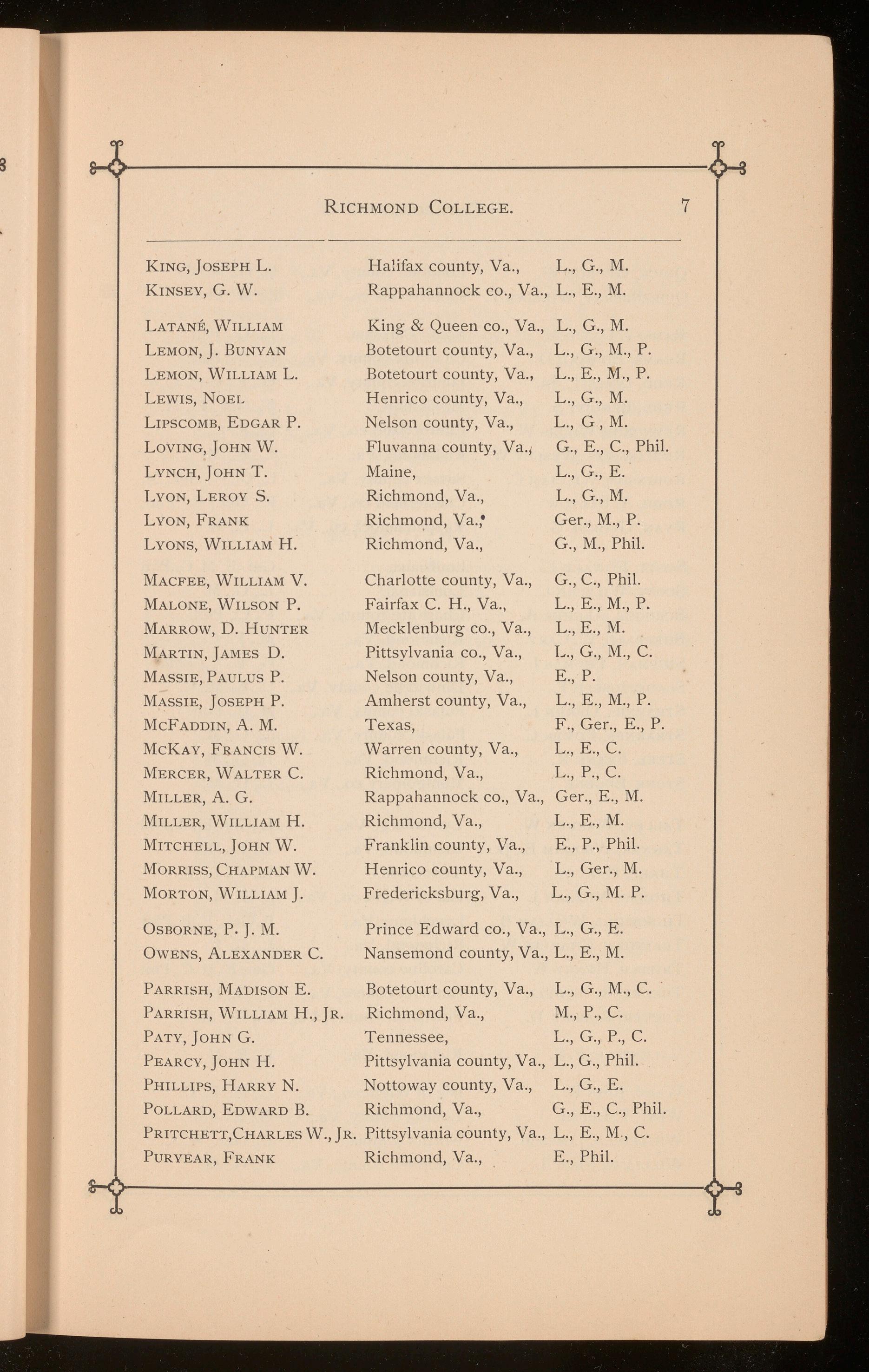
KING, JOSEPH L.
KINSEY, G. w.
LATANE, WILLIAM
LEMON, J. BUNYAN
LEMON, WILLIAM L.
LEWIS, NOEL
LIPSCOMB,EDGAR P.
LOVING, JOHN W.
LYNCH, JOHN T.
LYON, LEROY s.
LYON,FRANK
LYONS, WILLIAM H.
MACFEE, WILLIAM V.
MALONE, WILSON P.
MARROW,D. HUNTER
MARTIN, JAMES D.
MASSIE,PAULUS P.
MASSIE, JOSEPH P.
MCFADDIN, A. M.
McKAY, FRANCIS W.
MERCER, WALTER C.
MILLER, A. G.
MILLER, WILLIAM H.
MITCHELL, JOHN W.
MORRISS,CHAPMANW.
MORTON, \iVILLIAMJ.
OSBORNE, P. J.M.
OWENS, ALEXANDER C.
p ARRISH, MADISON E.
PARRISH, WILLIAM H., JR.
PATY, JOHN G.
PEARCY,JOHN H.
PHILLIPS, HARRY N.
POLLARD, EDWARD B.
Halifax county, Va., L., G., M. Rappahannock co., Va., L., E., M.
King & Queen co., Va., L., G., M. Botetourt county, Va., L., G., M., P.
Botetourt county, Va., L., E., M., P. Henrico county, Va., Nelson county, Va , Fluvanna county, Va.1 Maine,
Richmond, Va., Richmo_nd, Va.," Richmond, Va.,
Charlotte county, Va., Fairfax C. H., Va., Mecklenburg co., Va., Pittsylvania co., Va., Nelson county, Va., Amherst county, Va., Texas,
Warren county, Va., Richmond, Va.,
L., G., M. L., G, M. G., E., C., Phil. L., G., E. L., G., M. Ger., M., P. G., M., Phil. G.,C., Phil. L., E., M., P. L.,E., M. L., G., M., C. E., P. L., E ., M., P. F., Ger., E., P. L., E., C L., P., C. Rappahannock co., Va., Ger., E., M. Richmond, Va., Franklin county, Va., Henrico county, Va., Fredericksburg, Va., L., E., M. E., P., Phil. L., Ger., M. L., G., M. P.
Prince Edward co., Va., L., G., E. Nansemond county, Va., L., E., M.
Botetourt county, Va., L., G., M., C. Richmond, Va., M., P., C. Tennessee, L., G., P., C. Pittsylvania county, Va., L., G., Phil. Nottoway county, Va., L., G., E. Richmond, Va., G., E., C., Phil.
PRITCHETT,CHARLES W., JR. Pittsylvania county, Va., L., E., M., C.
PURYEAR, FRANK Richmond, Va., E., Phil.
8
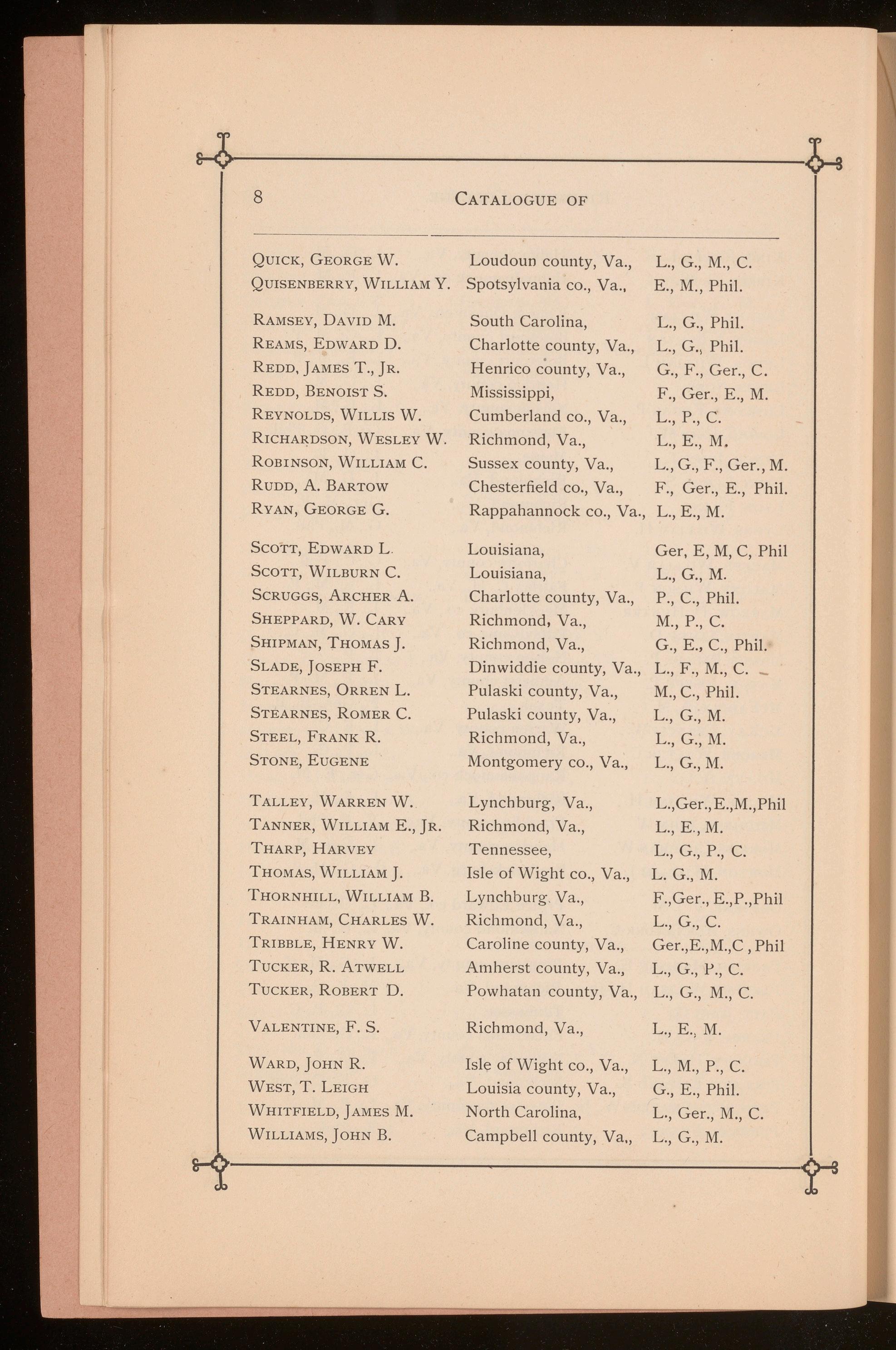
CATALOGUE OF
QUICK, GEORGE W. Loudoun county, Va., L., G., M., C. QUISENBERRY,WILLIAM Y. Spotsylvania co., Va., E., M., Phil.
RAMSEY,DAVID M. South Carolina, L., G., Phil. REAMS, EDWARDD. Charlotte county, Va., L., G., Phil.
REDD, JAMES T., JR. Henrico county, Va., G., F., Ger., C.
REDD, BENOIST S. Mississippi, F., Ger ., E., M. REYNOLDS,WILLIS W. Cumberland co., Va., L., P., C. RICHARDSON,WESLEY W. Richmond, Va., L., E., M.
ROBINSON, WILLIAM C. Sussex county, Va., L., G , F., Ger., M.
RUDD, A. BARTOW Chesterfield co., Va., F., Ger., E., Phil.
RYAN, GEORGE G. Rappahannock co., Va ., L.,E., M.
SCOTT, EDw ARD L Louisiana, Ger, E, M, C, Phil
SCOTT, WILBURN C. Louisiana, L., G., M.
SCRUGGS,ARCHER A. Charlotte county, Va., P., C., Phil. SHEPPARD, W.CARY Richmond, Va , M , P., C.
SHIPMAN, THOMASJ. Richmond, Va., G ., E., C., Phil.
SLADE, JOSEPH F. Dinwiddie county, Va., L., F., M., C.
STEARNES, ORREN L. Pu laski county, Va., M., C., Phil. STEARNES, ROMER C. Pulaski county, Va., L., G., M.
STEEL, FRANK R. Richmond, Va., L., G., M. STONE, EUGENE Montgomery co., Va., L., G ,M.
TALLEY, WARREN W. Lynchburg, Va., L.,Ger., E.,M.,Phil TANNER, WILLIAM E., JR. Richmond, Va., L., E.,M. THARP, HARVEY Tennessee, L., G., P., C. THOMAS,WILLIAM J. Isle of Wight co., Va., L. G., M. THORNHILL, WILLIAM B. Lynchburg Va., F.,Ger., E.,P.,Phil TRAINHAM,CHARLES W. Richmond, Va., L., G., C. TRIBBLE, HENRY W. Caroline county, Va., Ger.,E.,M.,C , Phil
TUCKER, R. ATWELL Amherst county, Va., L., G., P., C. TUCKER, ROBERT D. Powhatan county, Va., L., G., M., C.
VALENTINE, F. s. Richmond, Va., L., E., M.
WARD, JOHN R. Isle of Wight co., Va., L., M., P., C. WEST, T. LEIGH Louisia county, Va., G., E., Phil. WHITFIELD, JAMES M. North Carolina, L., Ger., M., C. WILLIAMS,JOHN B. Campbell county, Va,, L., G., M.

RICHMOND COLLEGE. 9
WILLIAMS,LEROY E. Richmond, Va., L., F., E., M. WILLIS, EDWARDJ. Richmond, Va., L., F., E., M., P. WILSON, FRANK L. Giles county, Va., L.,E., M. WILSON, LAWRENCEW. Westmoreland co., Va., L., M., P. WINSTON, CHARLESR. Richmond, Va., L., M., P. WISE, BARTONH. Richmond, Va., L., M., C. Woon, MATTHEWL. Pittsylvania county, Va., L., G., Phil. WOODARD,JAMESA., JR. North Carolina, Ger., E., M., P. WYER, WALTER P. Warrenton, Va., Ger., E., C.
RECAPITULATION.

Location.
The city of Richmond, along with its great natural beauty and rapidly increasing importance as a commercial, manufacturing, political and religious centre, combines other eminent advantages as a location for an institution of learning. Its easy accessibility, favorable climate, good society, and many aids and stimulants to mental culture, make yet more valuable its prime attributes of physical and moral healthfulness. Situated on hills opposite the falls of the James, it is free alike from the malarial fevers of tidewater, and from the pulmonary diseases of the mountain region.
For religious advantages, and wholesome moral tone, a more excellent community can nowhere be found. Young men who have already contracted vicious habits. or are predisposed to dissipation, will, of course, find temptations here as everywhere else, but it is confidently claimed, and the claim is supported by long experience, that all whose age and character qualify them to enter college at all, are comparatively safe under the restraining and ennobling influence of a distinctly Christian college in an exceptionally Christian city.
Grounds and Buildings.
The College premises embrace thirteen acres, just within the corporate limits, and in a portion of the city which, on account of its elevation and natural beauty, is devoted mainly to private
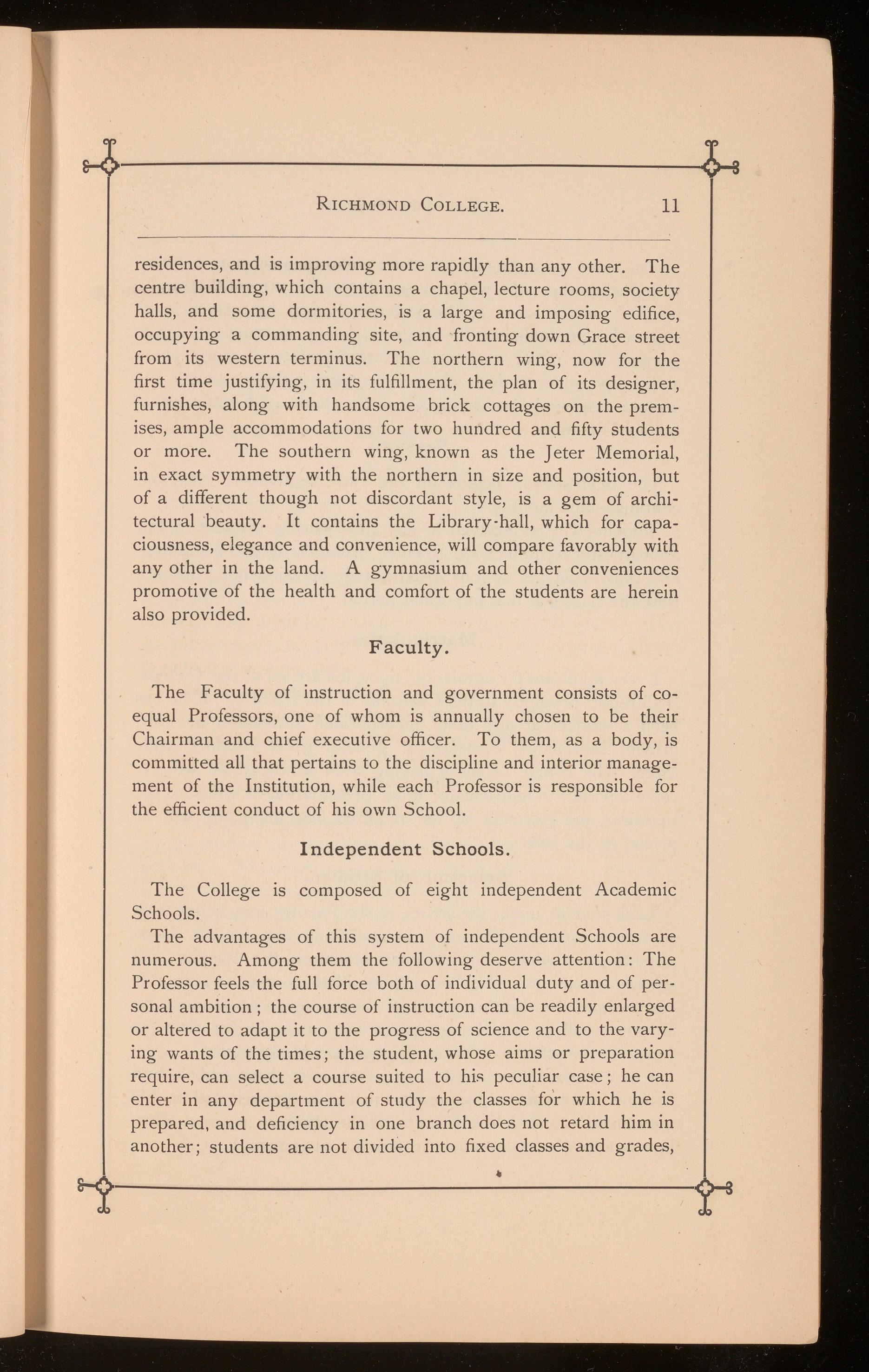
RICHMOND COLLEGE.
residences, and is improving more rapidly than any other. The centre building, which contains a chapel, lecture rooms, society halls, and some dormitories, is a large and imposing edifice, occupying a commanding site, and fronting down Grace street from its western terminus. The northern wing, now for the first time justifying, in its fulfillment, the plan of its designer, furnishes, along with handsome brick cottages on the premises, ample accommodations for two hundred and fifty students or more. The southern wing, known as the Jeter Memorial, in exact symmetry with the northern in size and position, but of a different though not discordant style, is a gem of architectural beauty. It contains the Library-hall, which for capaciousness, elegance and convenience, will compare favorably with any other in the land. A gymnasium and other conveniences promotive of the health and comfort of the students are herein also provided.
The Faculty of instruction and government consists of coequal Professors, one of whom is annually chosen to be their Chairman and chief executive officer. To them, as a body, is committed all that pertains to the discipline and interior management of the Institution, while each Professor is responsible for the efficient conduct of his own School.
The College is composed of eight independent Academic Schools.
The advantages of this system of independent Schools are numerous. Among them the following deserve attention: The Professor feels the full force both of individual duty and of personal ambition; the course of instruction can be readily enlarged or altered to adapt it to the progress of science and to the varying wants of the times; the student, whose aims or preparation require, can select a course suited to his peculiar case; he can enter in any department of study the classes for which he is prepared, and deficiency in one branch does not retard him in another; students are not divided into fixed classes and grades,
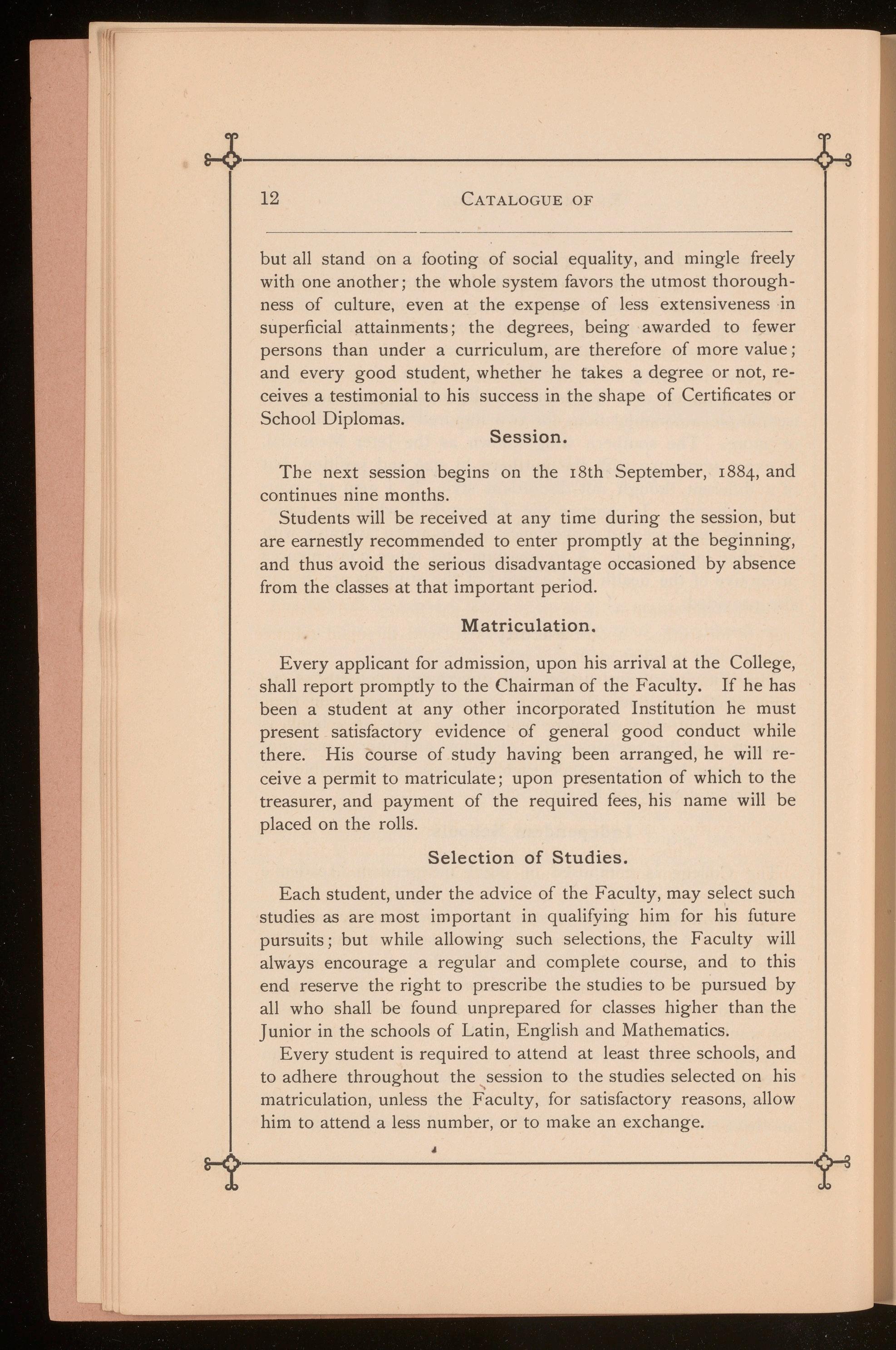
CATALOGUE OF
but all stand on a footing of social equality, and mingle freely with one another; the whole system favors the utmost thoroughness of culture, even at the expense of less extensiveness in superficial attainments; the degrees, being awarded to fewer persons than under a curriculum, are therefore of more value; and every good student, whether he takes a degree or not, receives a testimonial to his success in the shape of Certificates or School Diplomas.
The next session begins on the 18th September, 1884, and continues nine months.
Students will be received at any time during the session, but are earnestly recommended to enter promptly at the beginning, and thus avoid the serious disadvantage occasioned by absence from the classes at that important period.
Every applicant for admission, upon his arrival at the College, shall report promptly to the Chairman of the Faculty. If he has been a student at any other incorporated Institution he must present satisfactory evidence of general good conduct while there. His course of study having been arranged, he will receive a permit to matriculate; upon presentation of which to the treasurer, and payment of the required fees, his name will be placed on the rolls.
Each student, under the advice of the Faculty, may select such studies as are most important in qualifying him for his future pursuits; but while allowing such selections, the Faculty will always encourage a regular and complete course, and to this end reserve the right to prescribe the studies to be pursued by all who shall be found unprepared for classes higher than the Junior in the schools of Latin, English and Mathematics.
Every student is required to attend at least three schools, and to adhere throughout the session to the studies selected on his matriculation, unless the Faculty, for satisfactory reasons, allow him to attend a less number, or to make an exchange.
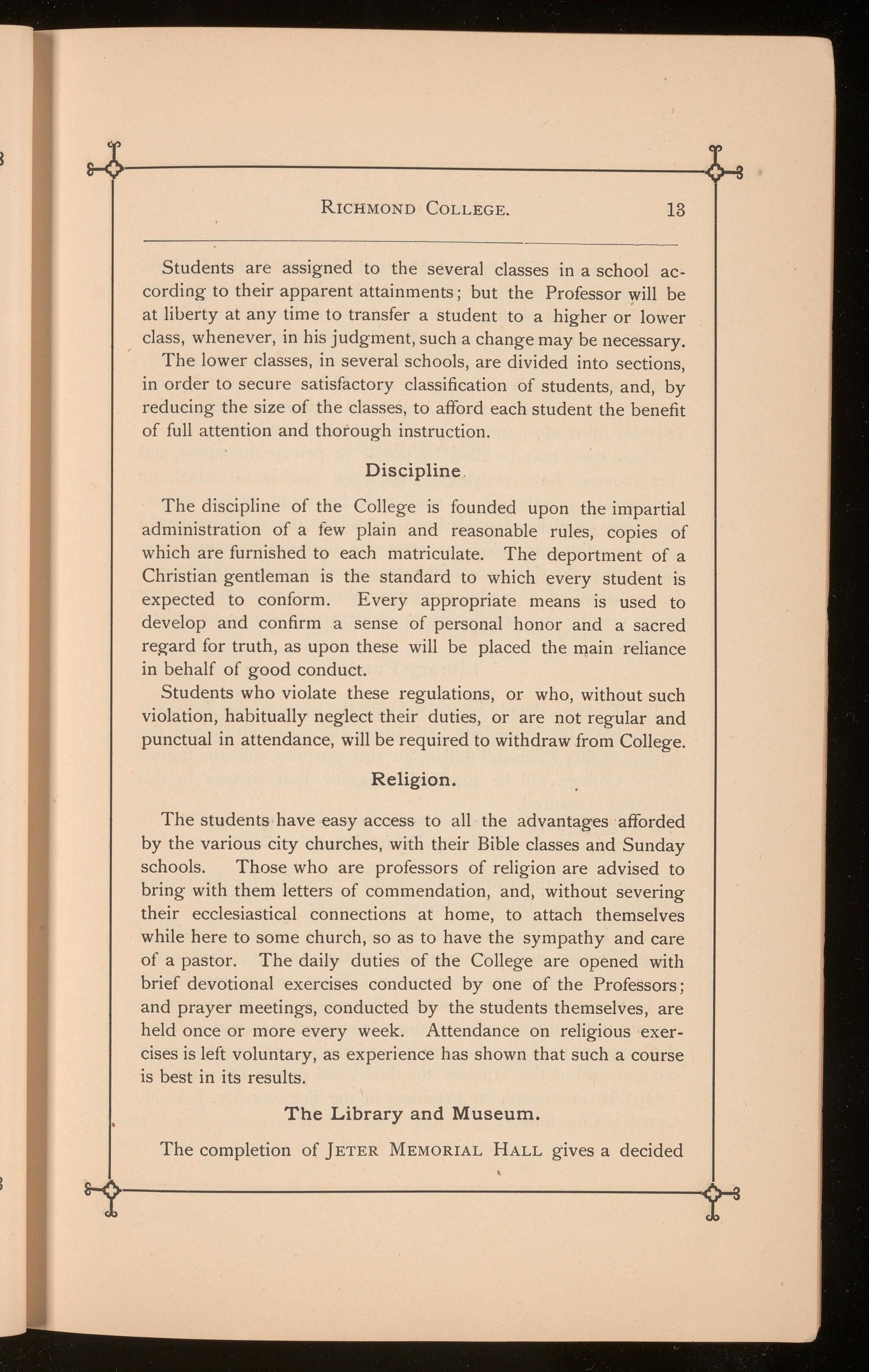
Students are assigned to the several classes in a school according to their apparent attainments; but the Professor will be at liberty at any time to transfer a student to a higher or lower class, whenever, in his judgment, such a change may be necessary. The lower classes, in several schools, are divided into sections, in order to secure satisfactory classification of students, and, by reducing the size of the classes, to afford each student the benefit of full attention and thorough instruction.
The discipline of the College is founded upon the impartial administration of a few plain and reasonable rules, copies of which are furnished to each matriculate. The deportment of a Christian gentleman is the standard to which every student is expected to conform. Every appropriate means is used to develop and confirm a sense of personal honor and a sacred regard for truth, as upon these will be placed the main reliance in behalf of good conduct.
Students who violate these regulations, or who, without such violation, habitually neglect their duties, or are not regular and punctual in attendance, will be required to withdraw from College.
The students have easy access to all the advantages afforded by the various city churches, with their Bible classes and Sunday schools. Those who are professors of religion are advised to bring with them letters of commendation, and, without severing their ecclesiastical connections at home, to attach themselves while here to some church, so as to have the sympathy and care of a pastor. The daily duties of the College are opened with brief devotional exercises conducted by one of the Professors; and prayer meetings, conducted by the students themselves, are held once or more every week. Attendance on religious exercises is left voluntary, as experience has shown that such a course is best in its results.
Library and Museum.
The completion of JETER MEMORIAL HALL gives a decided
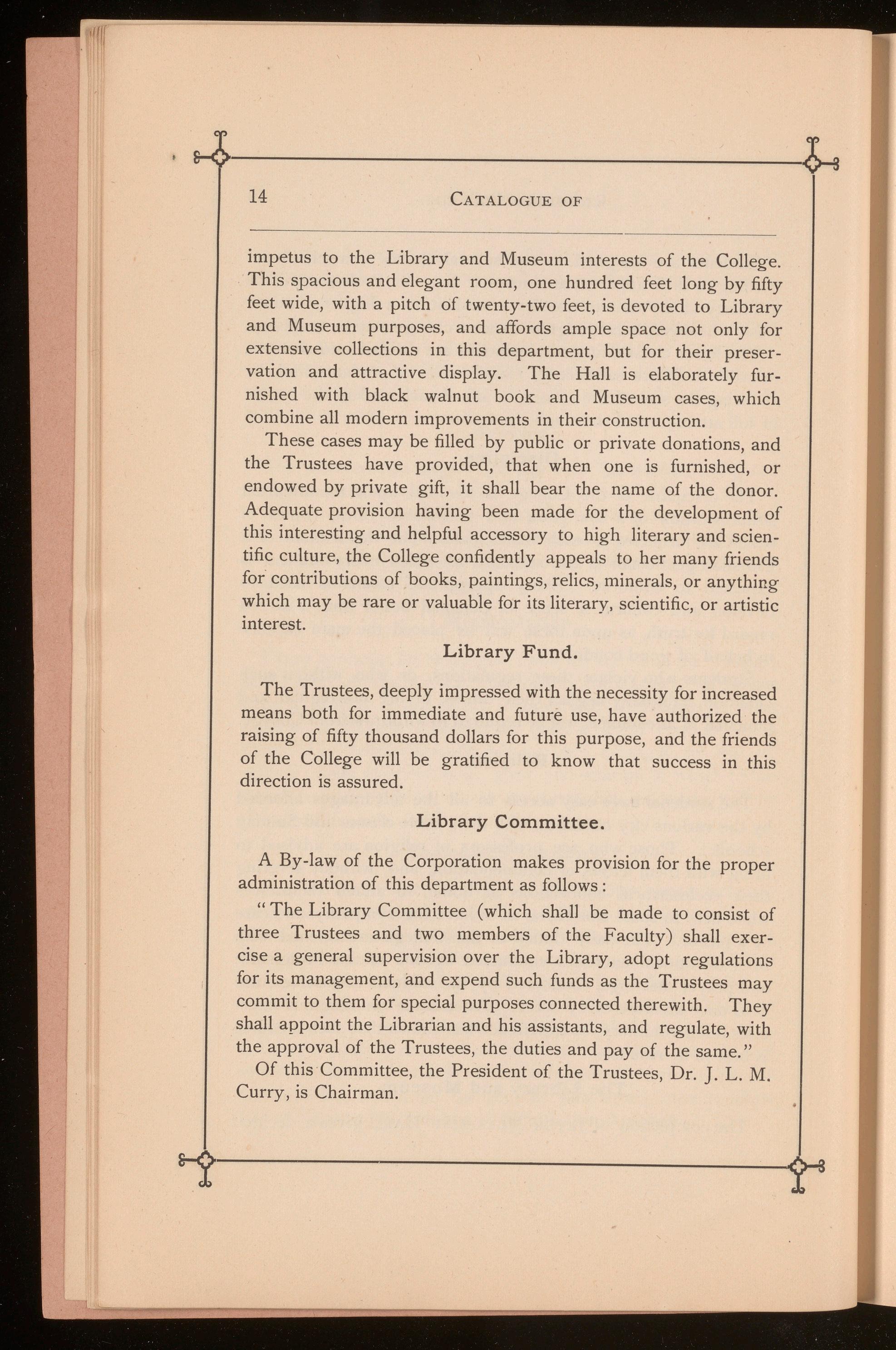
CATALOGUE OF
impetus to the Library and Museum interests of the College. This spacious and elegant room, one hundred feet long by fifty feet wide, with a pitch of twenty-two feet, is devoted to Library and Museum purposes, and affords ample space not only for extensive collections in this department, but for their preservation and attractive display. The Hall is elaborately furnished with black walnut book and Museum cases, which combine all modern improvements in their construction. These cases may be filled by public or private donations, and the Trustees have provided, that when one is furnished, or endowed by private gift, it shall bear the name of the donor. Adequate provision having been made for the development of this interesting and helpful accessory to high literary and scientific culture, the College confidently appeals to her many friends for contributions of books, paintings, relics, minerals, or anything which may be rare or valuable for its literary, scientific, or artistic interest.
Library Fund.
The Trustees, deeply impressed with the necessity for increased means both for immediate and future use, have authorized the raising of fifty thousand dollars for this purpose, and the friends of the College will be gratified to know that success in this direction is assured.
Library Committee.
A By-law of the Corporation makes provision for the proper administration of this department as follows :
"The Library Committee (which shall be made to consist of three Trustees and two members of the Faculty) shall exercise a general supervision over the Library, adopt regulations for its management, and expend such funds as the Trustees may commit to them for special purposes connected therewith. They shall appoint the Librarian and his assistants, and regulate, with the approval of the Trustees, the duties and pay of the same."
Of this Committee, the President of the Trustees, Dr. J. L. M. Curry, is Chairman.
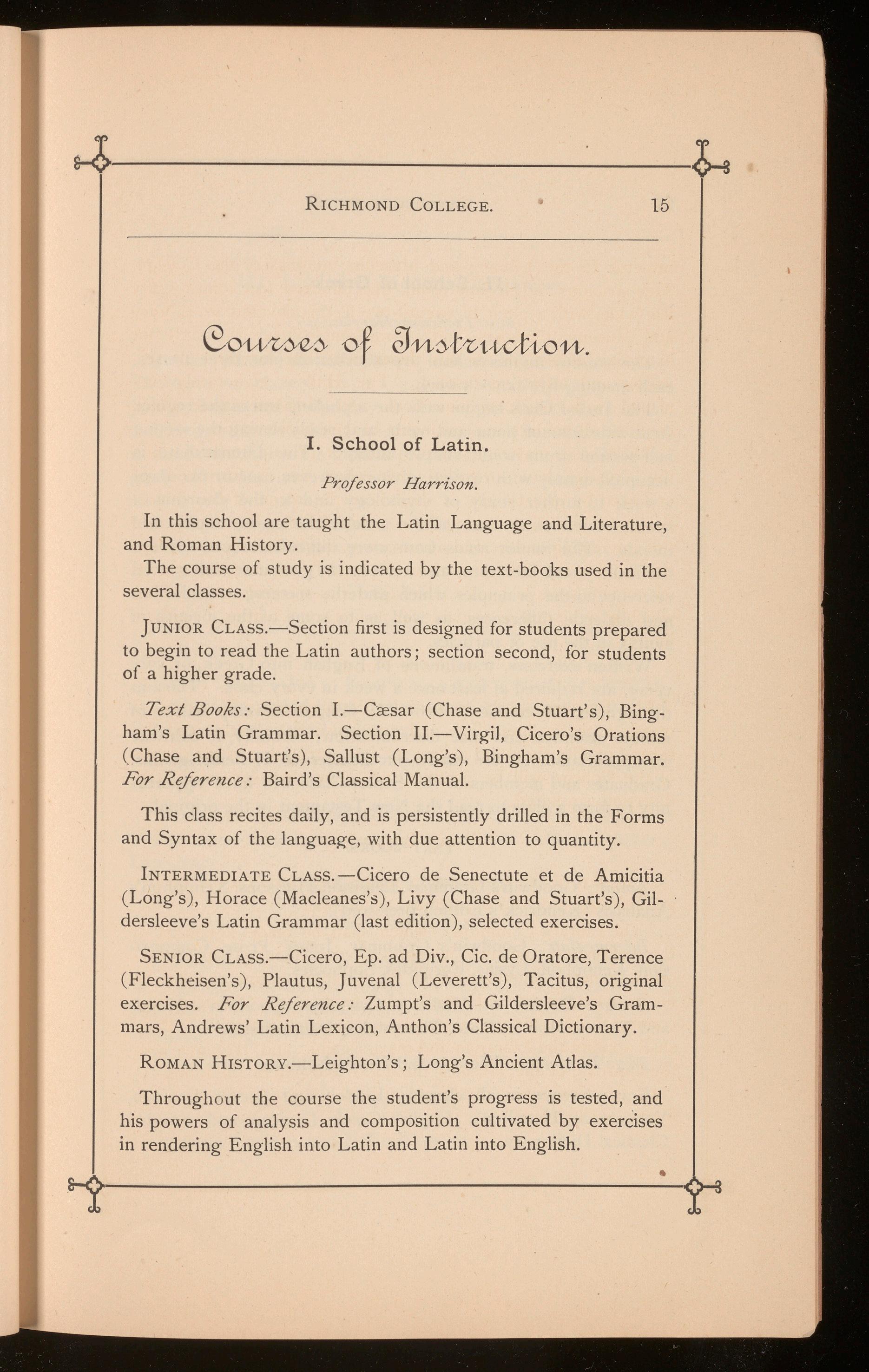
I. School of Latin.
Professor Harrison.
In this school are taught the Latin Language and Literature, and Roman History.
The course of study is indicated by the text-books used in the several classes.
JUNIOR CLASS.-Section first is designed for students prepared to begin to read the Latin authors; section second, for students of a higher grade.
Text Books: Section I.-Cresar (Chase and Stuart's), Bingham's Latin Grammar. Section II.-Virgil, Cicero's Orations (Chase and Stuart's), Sallust (Long's), Bingham's Grammar. For Reference: Baird's Classical Manual.
This class recites daily, and is persistently drilled in the Forms and Syntax of the language, with due attention to quantity.
INTERMEDIATECLASS.-Cicero de Senectute et de Amicitia (Long's), Horace (Macleanes's), Livy (Chase and Stuart's), Gildersleeve's Latin Grammar (last edition), selected exercises.
SENIOR CLASS.-Cicero, Ep. ad Div., Cic. de Oratore, Terence (Fleckheisen's), Plautus, Juvenal (Leverett's), Tacitus, original exercises. For Reference: Zumpt's and Gildersleeve's Grammars, Andrews' Latin Lexicon, Anthon's Classical Dictionary.
ROMAN HISTORY.-Leighton's; Long's Ancient Atlas.
Throughout the course the student's progress is tested, and his powers of analysis and composition cultivated by exercises in rendering English into Latin and Latin into English.
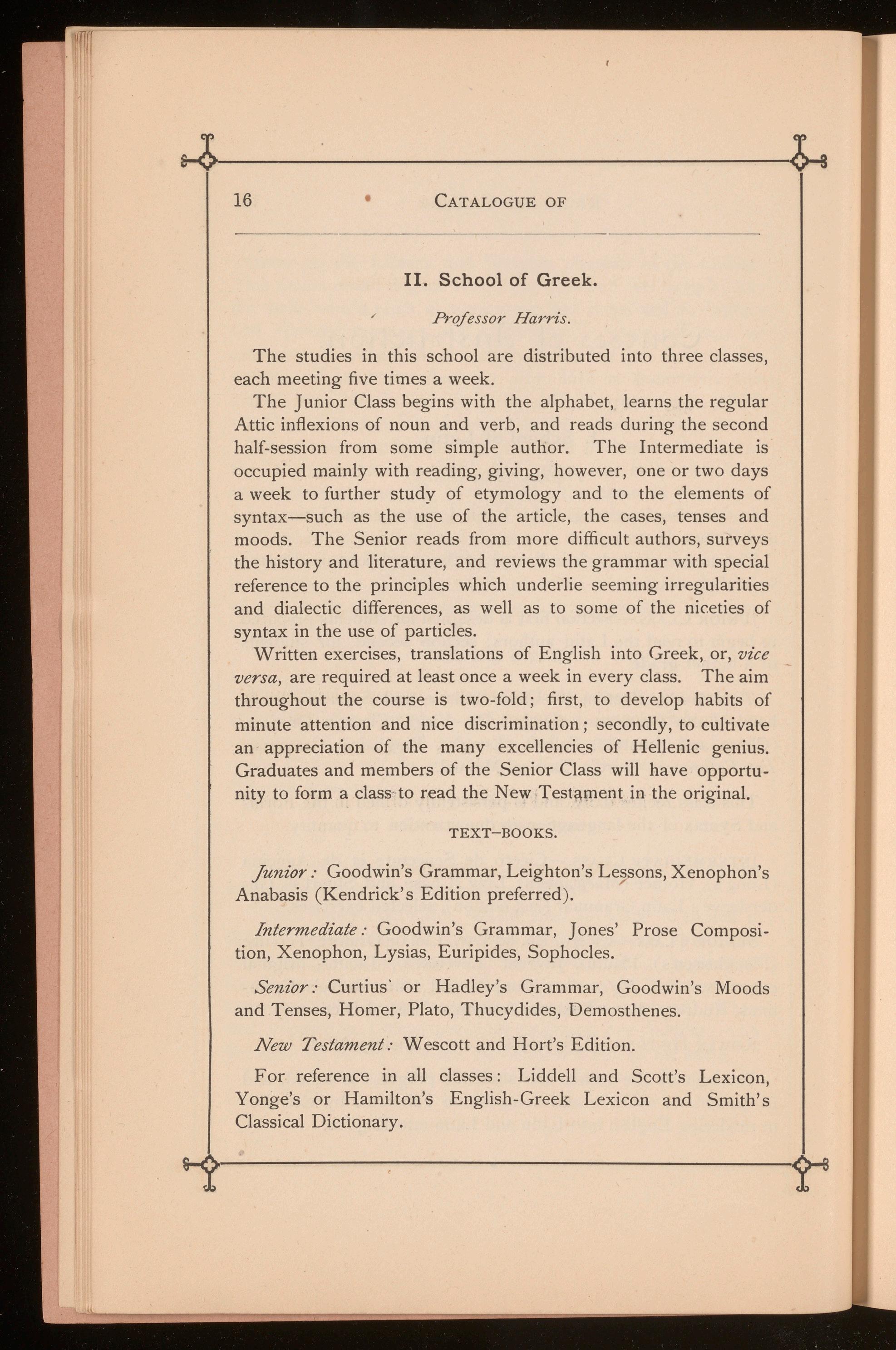
II. School of Greek. Professor Harris.
The studies m this school are distributed into three classes, each meeting five times a week.
The Junior Class begins with the alphabet, learns the regular Attic inflexions of noun and verb, and reads during the second half-session from some simple author. The Intermediate is occupied mainly with reading, giving, however, one or two days a week to further study of etymology and to the elements of syntax-such as the use of the article, the cases, tenses and moods. The Senior reads from more difficult authors, surveys the history and literature, and reviews the grammar with special reference to the principles which underlie se eming irregularities and dialectic differences, as well as to some of the niceties of syntax in the use of particles.
Written exercises, translations of English into Greek, or, vice versa, are required at least once a week in every class. The aim throughout the course is two-fold; first, to develop habits of minute attention and nice discrimination; secondly, to cultivate an appreciation of the many excellencies of Hellenic genius. Graduates and members of the Senior Class will have opportunity to form a class, to read the New Test,\r;nent in the original.
TEXT-BOOKS.
Junior: Goodwin ' s Grammar, Leighton's Le7'ons, Xenophon's Anabasis (Kendrick's Edition preferred ) .
Intermediate: Goodwin's Grammar, Jones' Prose Composition, Xenophon, Lysias, Euripides, Sophocles.
Senior: Curtius · or Hadley's Grammar, Goodwin's Moods and Tenses, Homer, Plato, Thucydides, Demosthenes
New Testament: Wescott and Hort's Edition.
For reference in all classes: Liddell and Scott's Lexicon, Yonge's or Hamilton's English-Greek Lexicon and Smith's Classical Dictionary.
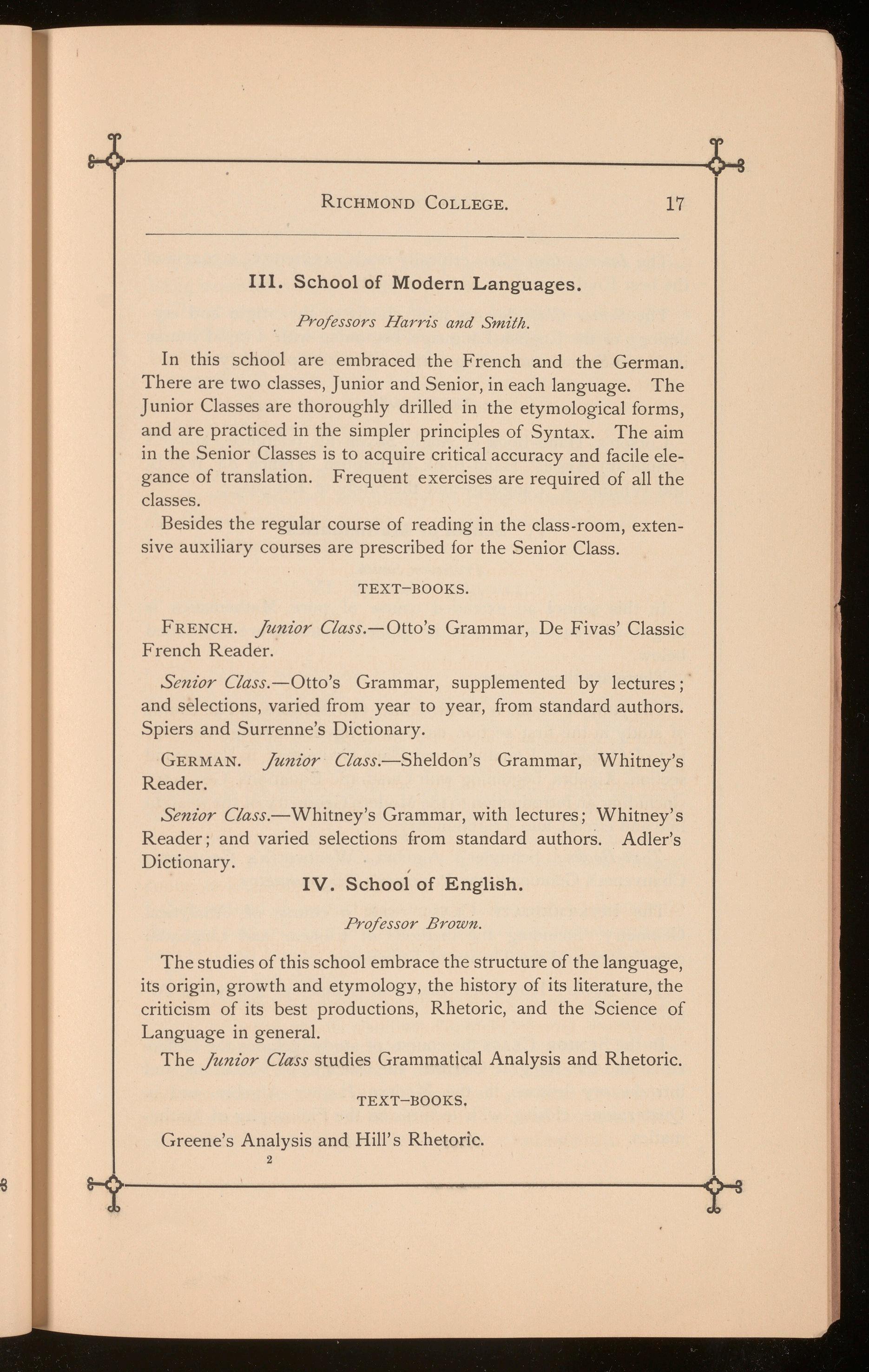
Professors Harris and Smith.
In this school are embraced the French and the German. There are two classes, Junior and Senior, in each language. The Junior Classes are thoroughly drilled in the etymological forms, and are practiced in the simpler principles of Syntax. The aim in the Senior Classes is to acquire critical accuracy and facile elegance of translation. Frequent exercises are required of all the classes.
Besides the regular course of reading in the class-room, extensive auxiliary courses are prescribed for the Senior Class.
TEXT-BOOKS.
FRENCH. Junior Class.-Otto's Grammar, De Fivas' Classic French Reader.
Senior Class.-Otto's Grammar, supplemented by lectures; and selections, varied from year to year, from standard authors. Spiers and Surrenne's Dictionary.
GERMAN. Junior Class.-Sheldon's Grammar, Whitney's Reader.
Senior Class.-Whitney's Grammar, with lectures; Whitney's Reader; and varied selections from standard authors. Adler's Dictionary. , IV. School of English.
Professor Brown.
The studies of this school embrace the structure of the language, its origin, growth and etymology, the history of its literature, the criticism of its best productions, Rhetoric, and the Science of Language in general.
The Junior Class studies Grammatical Analysis and Rhetoric.
TEXT-BOOKS.
Greene's Analysis and Hill's Rhetoric.
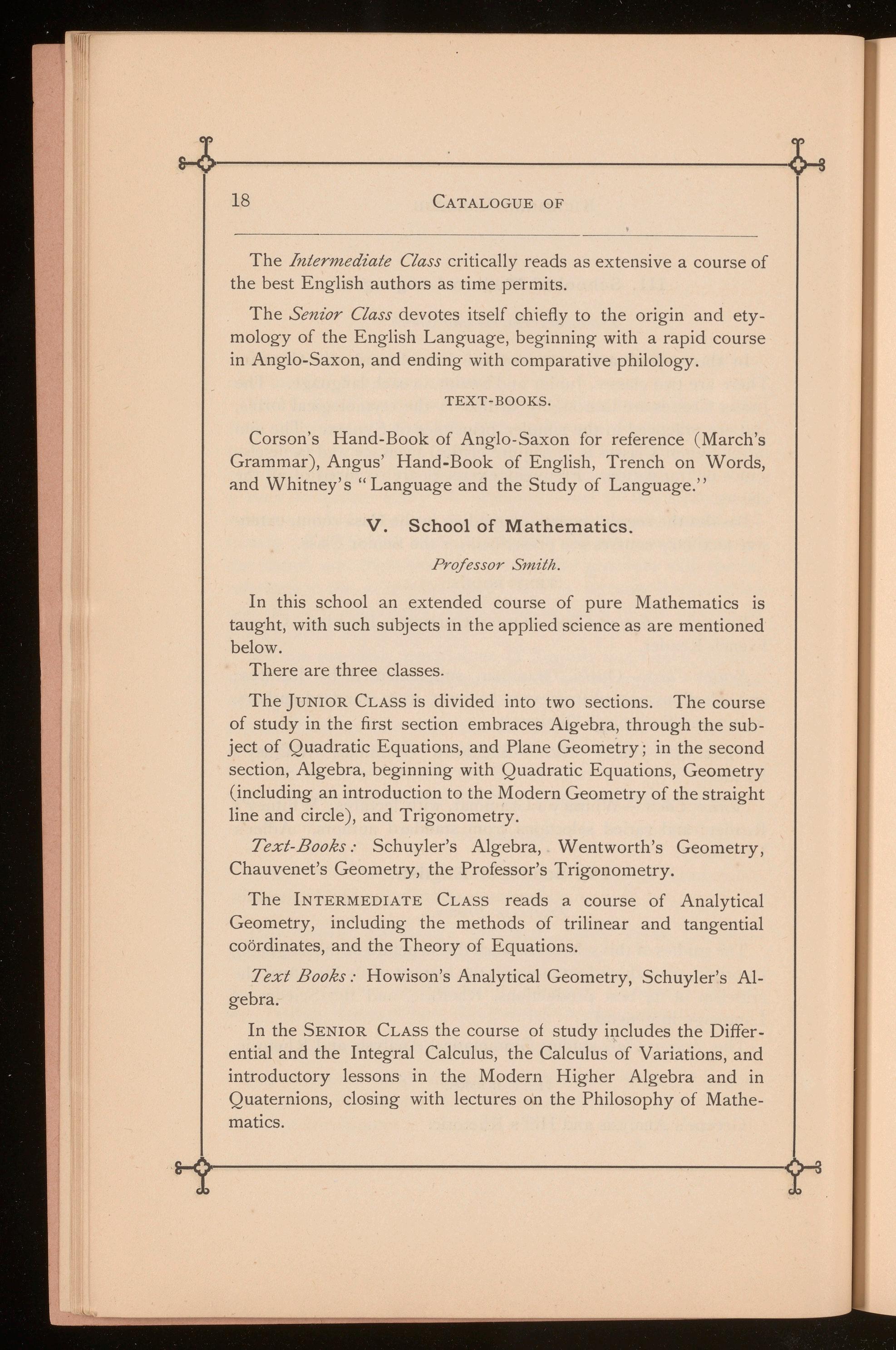
The Intermediate Class critically reads as extensive a course of the best English authors as time permits.
The Senior Class devotes itself chiefly to the origin and etymology of the English Language, beginning with a rapid course in Anglo-Saxon, and ending with comparative philology.
TEXT-BOOKS.
Corson's Hand-Book of Anglo-Saxon for reference ( March's Grammar), Angus' Hand-Book of English, Trench on Words, and Whitney's "Language and the Study of Language."
V. School of Mathematics. Professor Smith.
In this school an extended course of pure Mathematics is taught, with such subjects in the applied science as are mentioned below.
There are three classes.
The JUNIOR CLASS is divided into two sections. The course of study in the first section embraces Algebra, through the subject of Quadratic Equations, and Plane Geometry; in the second section, Algebra, beginning with Quadratic Equations, Geometry (including an introduction to the Modern Geometry of the straight line and circle), and Trigonometry.
Text-Books: Schuyler's Algebra, Wentworth's Geometry, Chauvenet's Geometry, the Professor's Trigonometry.
The INTERMEDIATE CLASS reads a course of Analytical Geometry, including the methods of trilinear and tangential coordinates, and the Theory of Equations.
Text Books: Howison's Analytical Geometry, Schuyler's Algebra.
In the SENIOR CLASS the course of study includes the Differential and the Integral Calculus, the Calculus of Variations, and introductory lessons in the Modern Higher Algebra and in Quaternions, closing with lectures on the Philosophy of Mathematics.
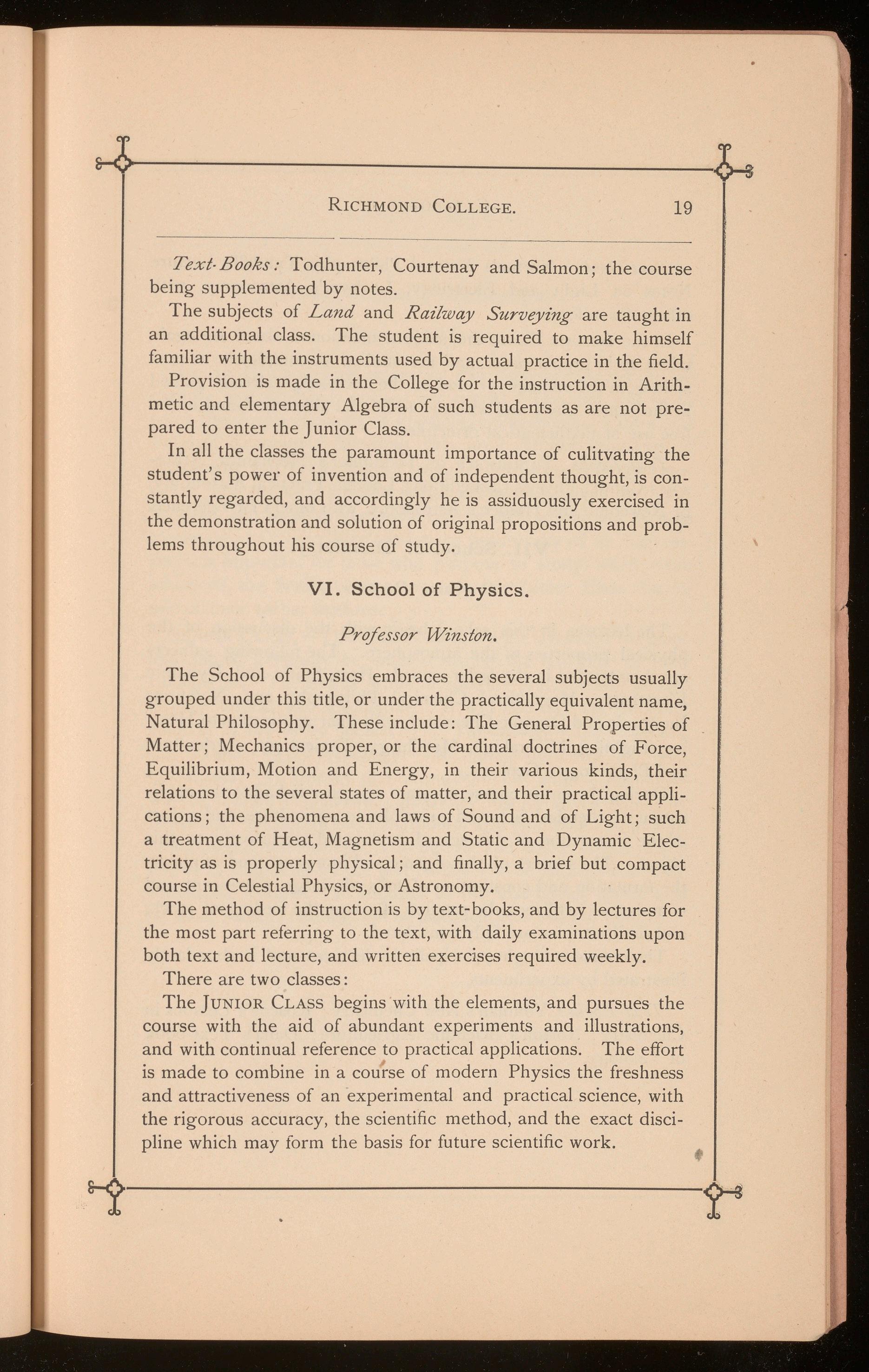
Text- Books: Todhunter, Courtenay and Salmon; the course being supplemented by notes.
The subjects of Land and Railway Surveying are taught in an additional class. The student is required to make himself familiar with the instruments used by actual practice in the field. Provision is made in the College for the instruction in Arithmetic and elementary Algebra of such students as are not prepared to enter the Junior Class.
In all the classes the paramount importance of culitvating the student's power of invention and of independent thought, is constantly regarded, and accordingly he is assiduously exercised in the demonstration and solution of original propositions and problems throughout his course of study.
Professor Winston.
The School of Physics embraces the several subjects usually grouped under this title, or under the practically equivalent name, Natural Philosophy. These include: The General Properties of Matter; Mechanics proper, or the cardinal doctrines of Force, Equilibrium, Motion and Energy, in their various kinds, their relations to the several states of matter, and their practical applications; the phenomena and laws of Sound and of Light; such a treatment of Heat, Magnetism and Static and Dynamic Electricity as is properly physical; and finally, a brief but compact course in Celestial Physics, or Astronomy.
The method of instruction is by text-books, and by lectures for the most part referring to the text, with daily examinations upon both text and lecture, and written exercises required weekly.
There are two classes:
The JUNIOR CLASS begins with the elements, and pursues the course with the aid of abundant experiments and illustrations, and with continual reference to practical applications. The effort is made to combine in a course of modern Physics the freshness and attractiveness of an experimental and practical science, with the rigorous accuracy, the scientific method, and the exact discipline which may form the basis for future scientific work.
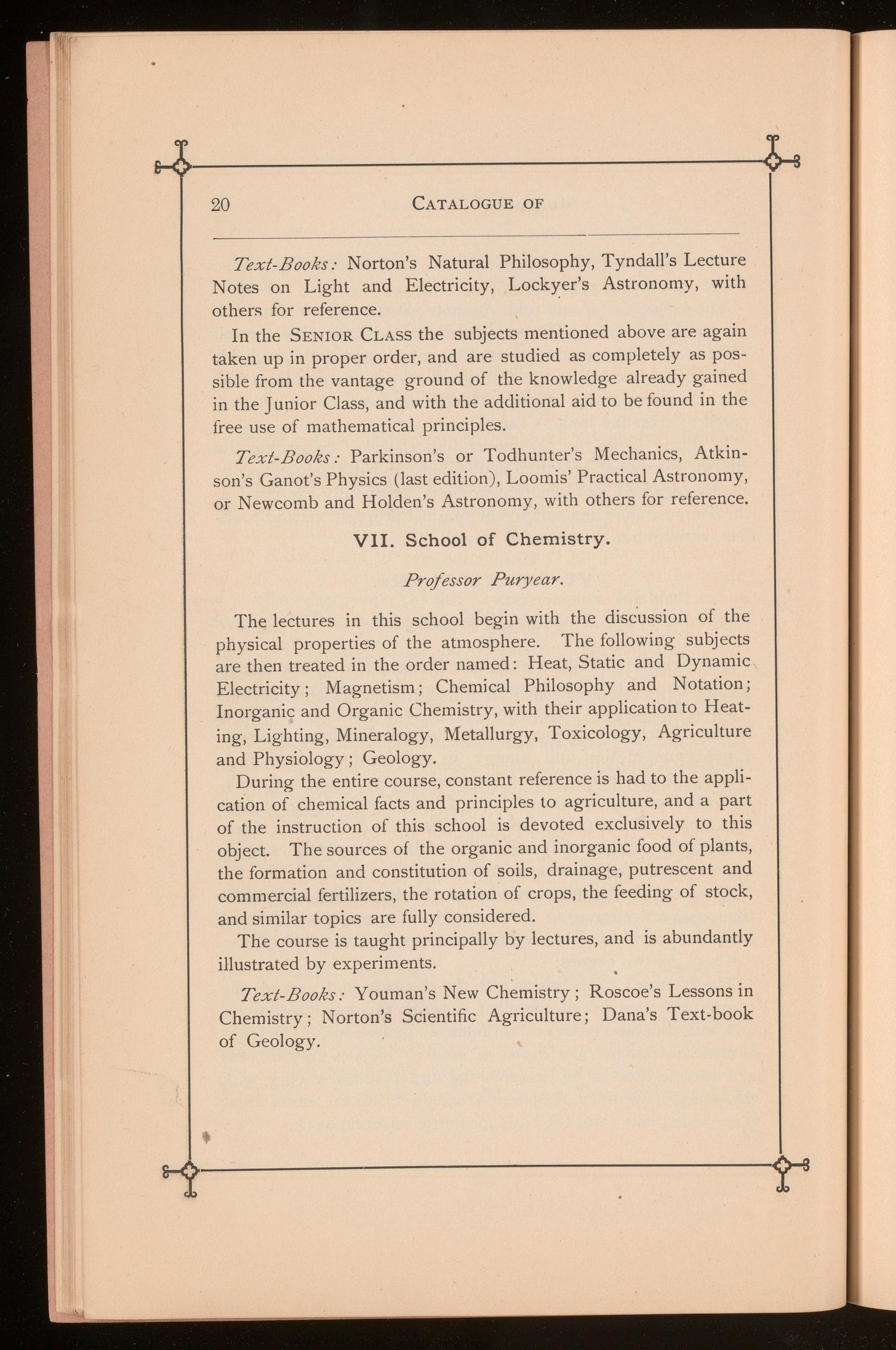
Text-Books: Norton's Natural Philosophy, Tyndall's Lecture Notes on Light and Electricity, Lockyer's Astronomy, with others for reference. ·
In the SENIOR CLASSthe subjects mentioned above are again taken up in proper order, and are studied as completely as possible from the vantage ground of the knowledge already gained in the Junior Class, and with the additional aid to be found in the free use of mathematical principles.
Text-Bool,s: Parkinson's or Todhunter's Mechanics, Atkinson's Ganot's Physics (last edition ) , Loomis' Practical Astronomy, or Newcomb and Holden's Astronomy, with others for reference.
Professor Puryear.
The lectures in this school begin with the disc 'ussion of the physical properties of the atmosphere. The following subjects are then treated in the order named: Heat, Static and Dynamic Electricity; Magnetism; Chemical Philosophy and Notation; Inorganic and Organic Chemistry, with their application to Heating, Lighting, Mineralogy, Metallurgy, Toxicology, Agriculture and Physiology; Geology.
During the entire course, constant reference is had to the application of chemical facts and principles to agriculture, and a part of the instruction of this school is devoted exclusively to this object. The sources of the organic and inorganic food of plants, the formation and constitution of soils, drainage, putrescent and commercial fertilizers, the rotation of crops, the feeding of stock, and similar topics are fully considered.
The course is taught principally by lectures, and is abundantly illustrated by experiments.
Text-Books : Youman's New Chemistry; Roscoe's Lessons in Chemistry; Norton's Scientific Agriculture; Dana's Text-book of Geology.
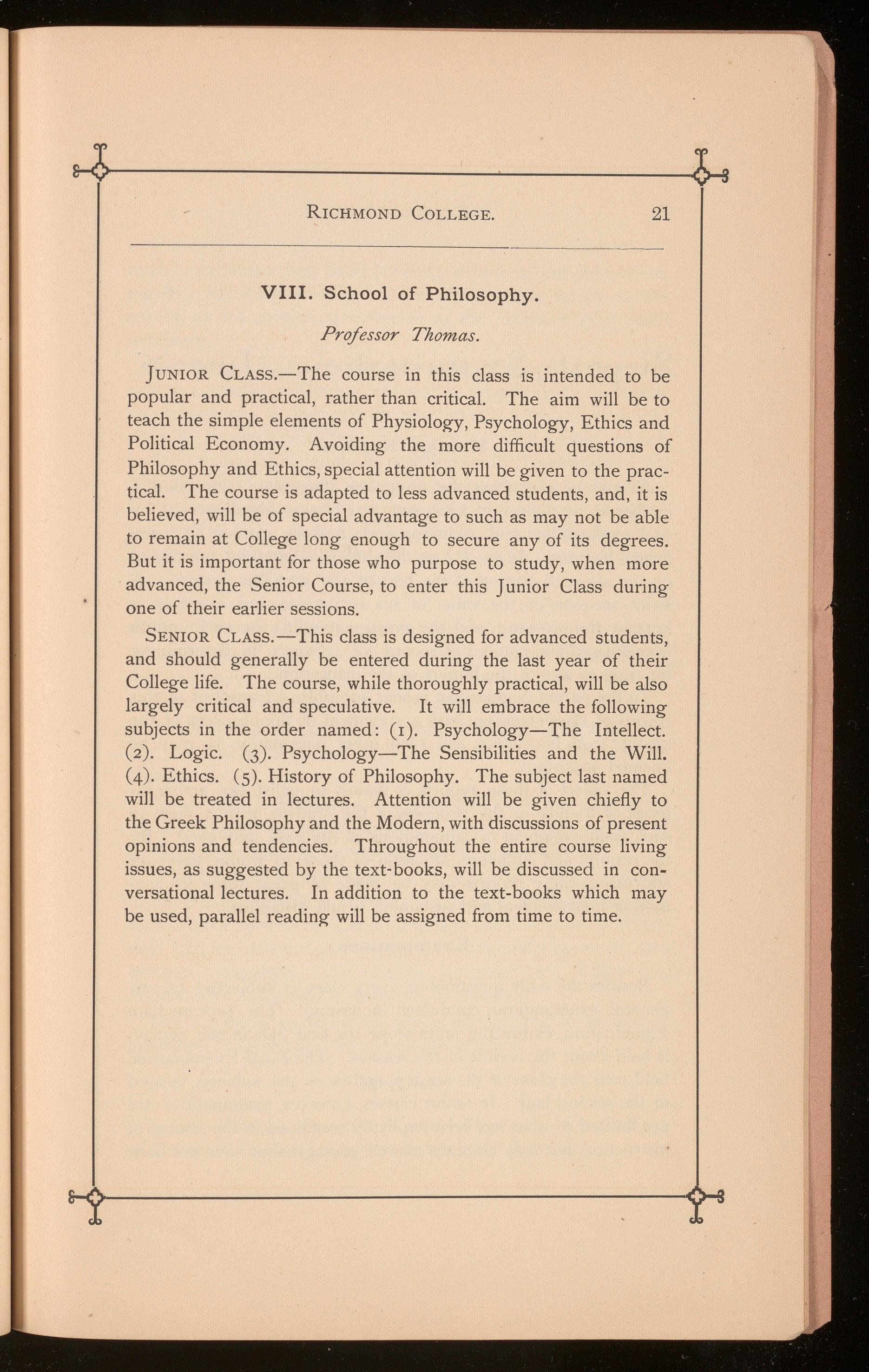
VIII.
Professor Thomas.
JUNIOR CLASS.-The course in this class is intended to be popular and practical, rather than critical. The aim will be to teach the simple elements of Physiology, Psychology, Ethics and Political Economy. Avoiding the more difficult questions of Philosophy and Ethics, special attention will be given to the practical. The course is adapted to less advanced students, and, it is believed, will be of special advantage to such as may not be able to remain at College long enough to secure any of its degrees. But it is important for those who purpose to study, when more advanced, the Senior Course, to enter this Junior Class during one of their earlier sessions.
SENIOR CLASS.-This class is designed for advanced students, and should generally be entered during the last year of their College life. The course, while thoroughly practical, will be also largely critical and speculative. It will embrace the following subjects in the order named: (r). Psychology-The Intellect. (2). Logic. (3). Psychology-The Sensibilities and the Will. (4). Ethics. (5). History of Philosophy. The subject last named will be treated in lectures. Attention will be given chiefly to the Greek Philosophy and the Modern, with discussions of present opinions and tendencies. Throughout the entire course living issues, as suggested by the text-books, will be discussed in conversational lectures. In addition to the text-books which may be used, parallel reading will be assigned from time to time.
CATALOGUE OF
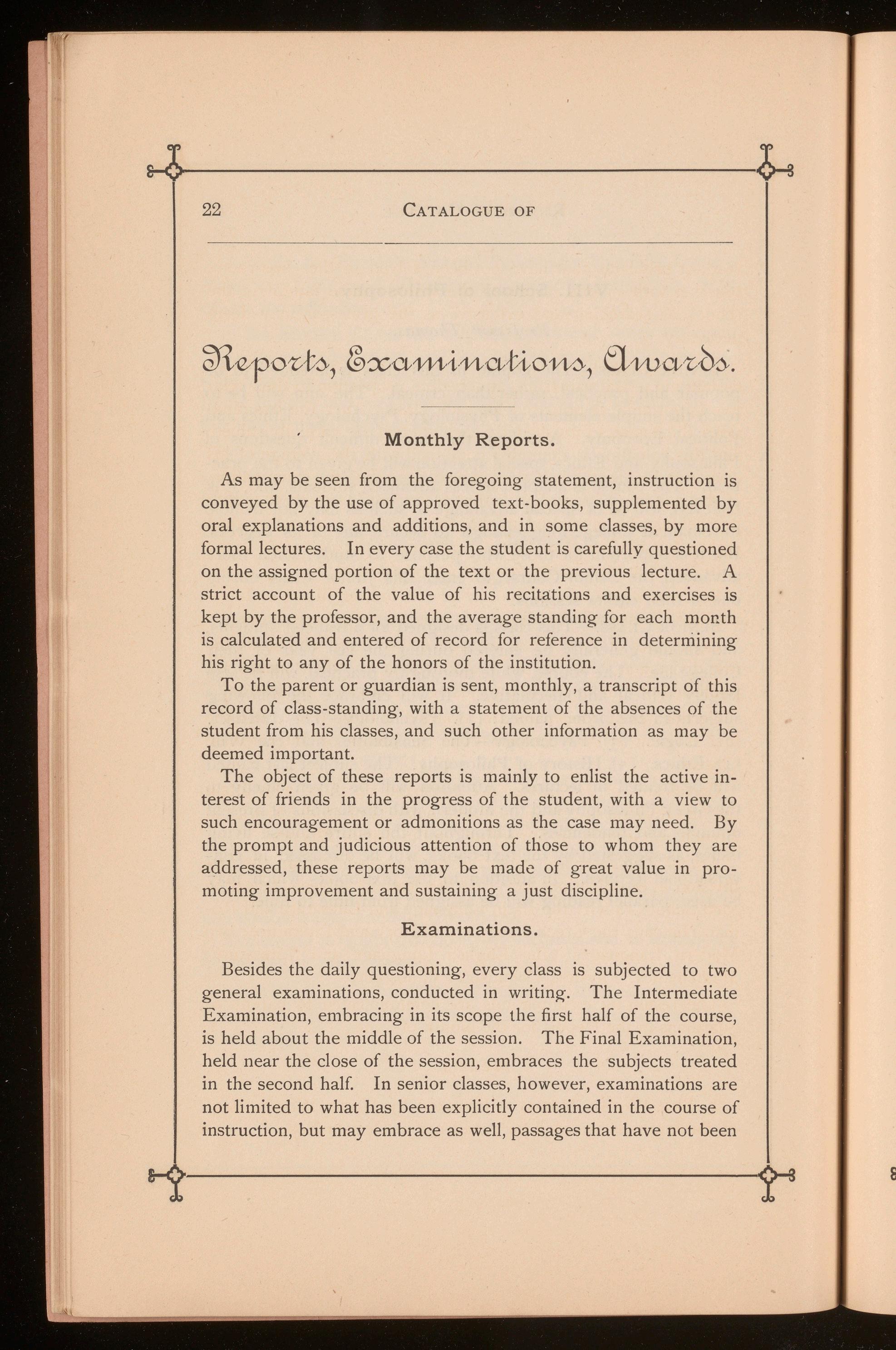
As may be seen from the foregoing statement, instruction is conveyed by the use of approved text-books, supplemented by oral explanations and additions, and in some classes, by more formal lectures . In every case the student is carefully questioned on the assigned portion of the text or the previous lecture. A strict account of the value of his recitations and exercises is kept by the professor, and the average standing for each month is calculated and entered of record for reference in determining his right to any of the honors of the institution .
To the parent or guardian is sent, monthly, a transcript of this record of class-standing, with a statement of the absences of the student from his classes, and such other information as may be deemed important.
The object of these reports is mainly to enlist the active interest of friends in the progress of the student, with a view to such encouragement or admonitions as the case may ne ed. By the prompt and judicious attention of those to whom they are addressed, these reports may be made of great value m promoting improvement and sustaining a just discipline.
Besides the daily questioning, every class is subjected to two general examinations, conducted in writing- Th e Intermediate Examination, embracing in its scope the first half of the course, is held about the middle of the session. The Final Examination, held near the close of the session, embraces the subjects treated in the second half. In senior classes, however, examinations are not limited to what has been explicitly contained in the course of instruction, but may embrace as well, passages that have not been
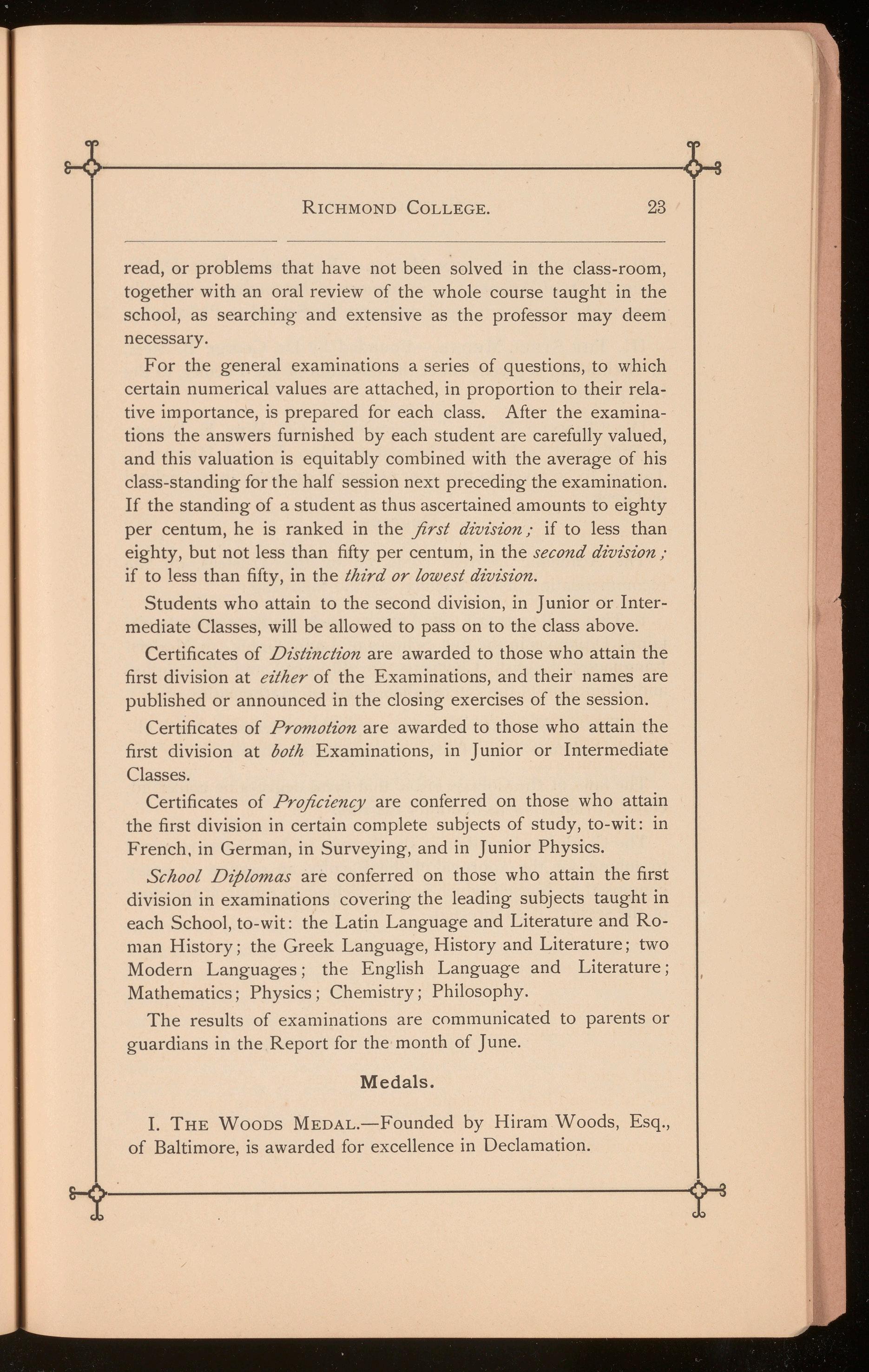
read, or problems that have not been solved in the class-room, together with an oral review of the whole course taught in the school, as searching and extensive as the professor may deem necessary.
For the general examinations a series of questions, to which certain numerical values are attached, in proportion to their relative importance, is prepared for each class. After the examinations the answers furnished by each student are carefully valued, and this valuation is equitably combined with the average of his class-standing for the half session next preceding the examination. If the standing of a student as thus ascertained amounts to eighty per centum, he is ranked in the first division; if to less than eighty, but not less than fifty per centum, in the second division; if to less than fifty, in the third or lowest division.
Students who attain to the second division, in Junior or Intermediate Classes, will be allowed to pass on to the class above.
Certificates of Distinction are awarded to those who attain the first division at either of the Examinations, and their names are published or announced in the closing exercises of the session.
Certificates of Promotion are awarded to those who attain the first division at both Examinations, in Junior or Intermediate Classes.
Certificates of Proficiency are conferred on those who attain the first division in certain complete subjects of study, to-wit: in French, in German, in Surveying, and in Junior Physics.
School Diplomas are conferred on those who attain the first division in examinations covering the leading subjects taught in each School, to-wit: the Latin Language and Literature and Roman History; the Greek Language, History and Literature; two Modern Languages; the English Language and Literature; Mathematics; Physics; Chemistry; Philosophy.
The results of examinations are communicated to parents or guardians in the Report for the month of June. Medals.
I. THE Wooos MEDAL-Founded by Hiram Woods, Esq., of Baltimore, is awarded for excellence in Declamation.
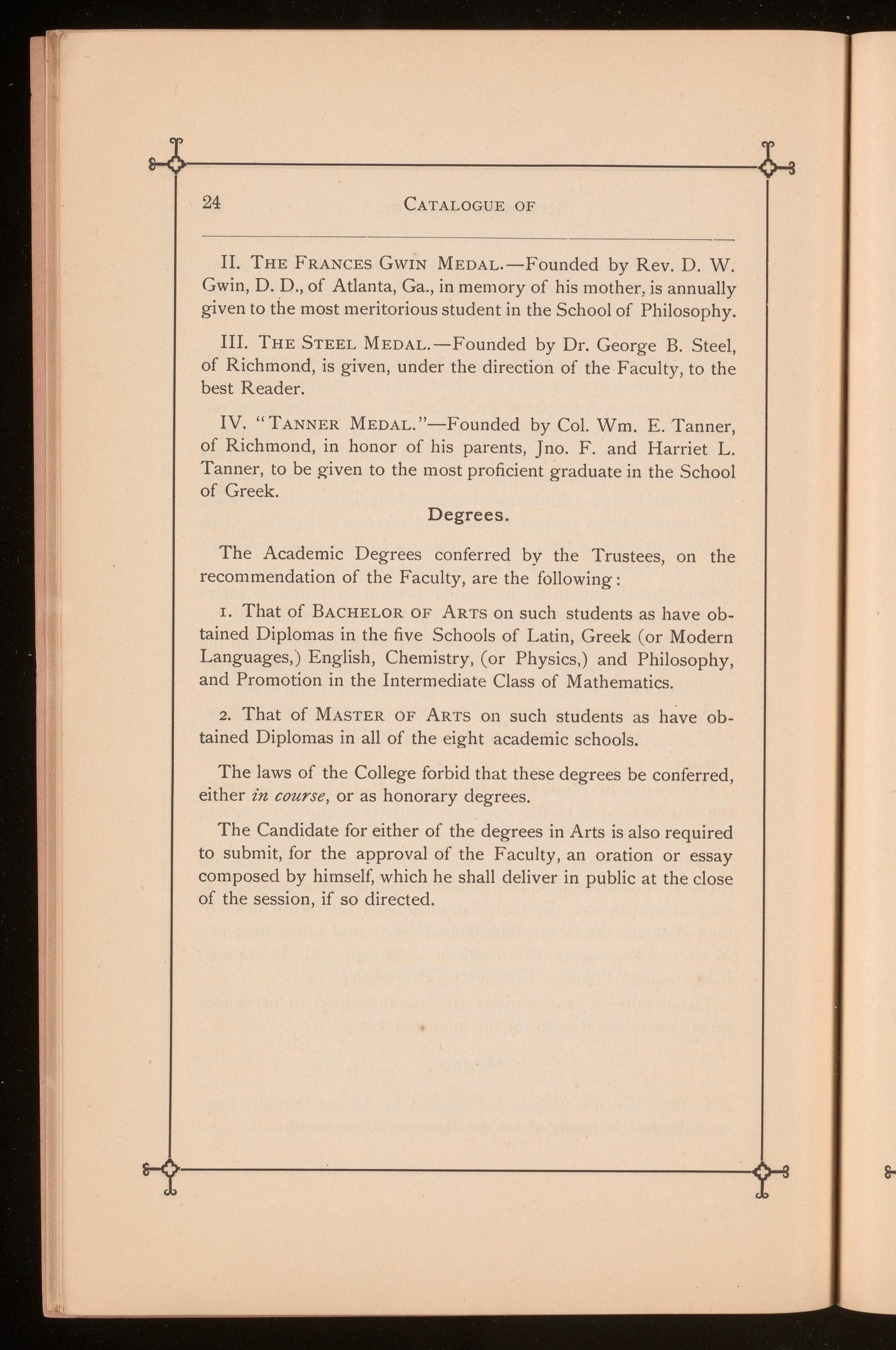
II. THE FRANCES GwIN MEDAL.-Founded by Rev. D. W. Gwin, D. D., of Atlanta, Ga., in memory of his mother, is annually given to the most meritorious student in the School of Philosophy.
III. THE STEEL MEDAL.-Founded by Dr. George B. Steel, of Richmond, is given, under the direction of the Faculty, to the best Reader.
IV. "TANNER MEDAL."-Founded by Col. Wm. E. Tanner, of Richmond, in honor of his parents, Jno. F. and Harriet L. Tanner, to be given to the most proficient graduate in the School of Greek. Degrees.
The Academic Degrees conferred by the Trustees, on the recommendation of the Faculty, are the following:
r. That of BACHELOROF ARTS on such students as have obtained Diplomas in the five Schools of Latin, Greek (or Modern Languages,) English, Chemistry, (or Physics,) and Philosophy, and Promotion in the Intermediate Class of Mathematics.
2. That of MASTER OF ARTS on such students as have obtained Diplomas in all of the eight academic schools.
The laws of the College forbid that these degrees be conferred, either in course, or as honorary degrees.
The Candidate for either of the degrees in Arts is also required to submit, for the approval of the Faculty, an oration or essay composed by himself, which he shall deliver in public at the close of the session, if so directed.
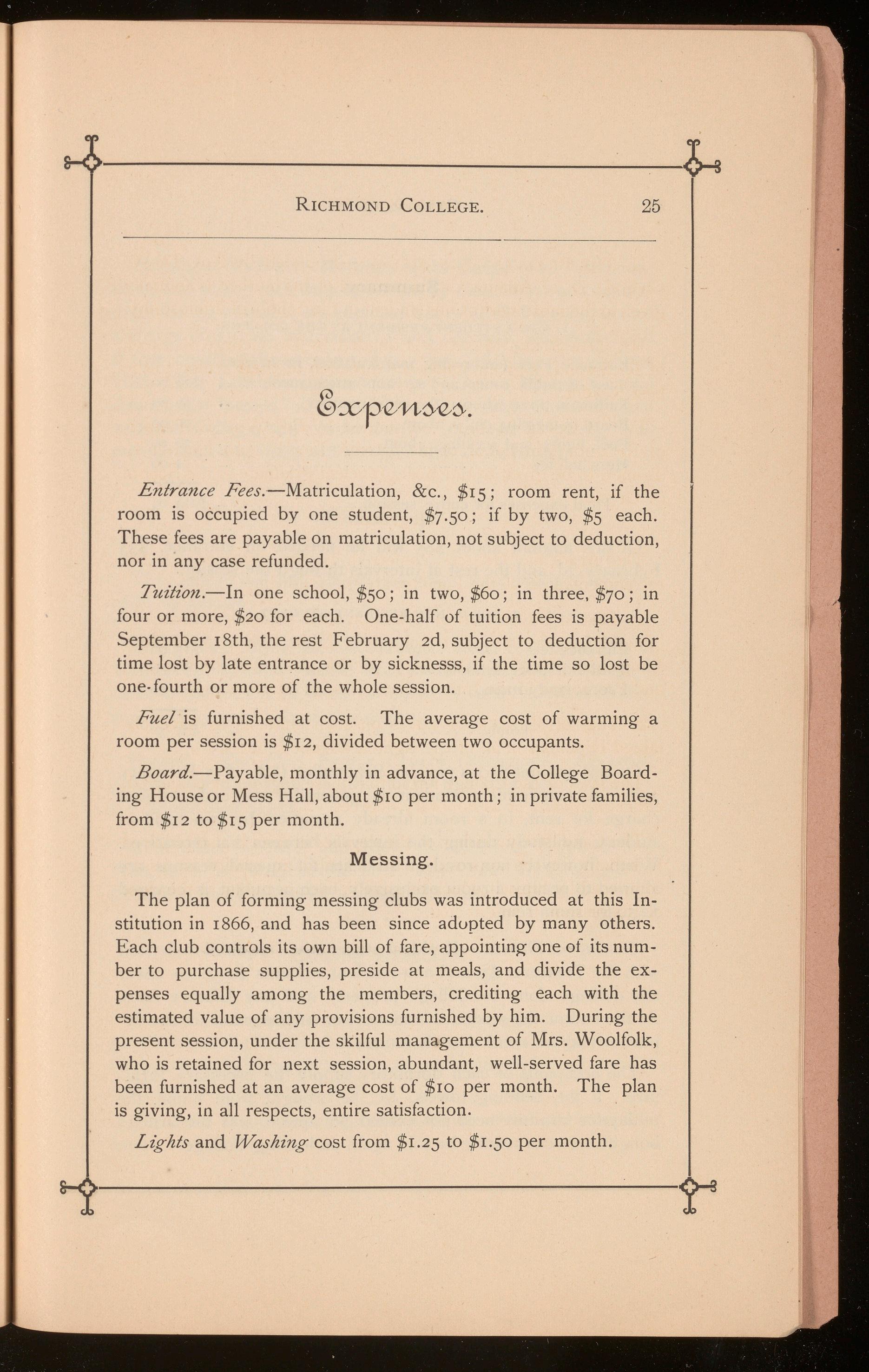
Entranc e Fees.-Matriculation, &c., $15 ; room rent, if the room is occupied by one student, $7.50; if by two, $5 each. These fees are payable on matriculation, not subject to deduction, nor in any case refunded.
Tuition.-ln one school, $50 ; in two, $6o; in three, $70; in four or more, $20 for each. One-half of tuition fees is payable September 18th, the rest February 2d, subject to deduction for time lost by late entrance or by sicknesss, if the time so lost be one-fourth or more of the whole session.
Fuel is furnished at cost. The average cost of warming a room per session is $12, divided between two occupants.
Board.-Payable, monthly in advance, at the College Boarding House or Mess Hall , about $10 per month; in private families, from $12 to $15 per month.
The plan of forming messing clubs was introduced at this Institution in 1866, and has been since adupted by many others . Each club controls its own bill of fare, appointing- one of its number to purchase supplies, preside at meals, and divide the expenses equally among the members, crediting each with the estimated value of any provisions furnished by him. During the present session, under the skilful management of Mrs. Woolfolk, who is retained for next session, abundant, well-served fare has been furnished at an average cost of $10 per month. The plan is giving, in all respects, entire satisfaction.
Lights and Washing cost from $1.25 to $1.50 per month.
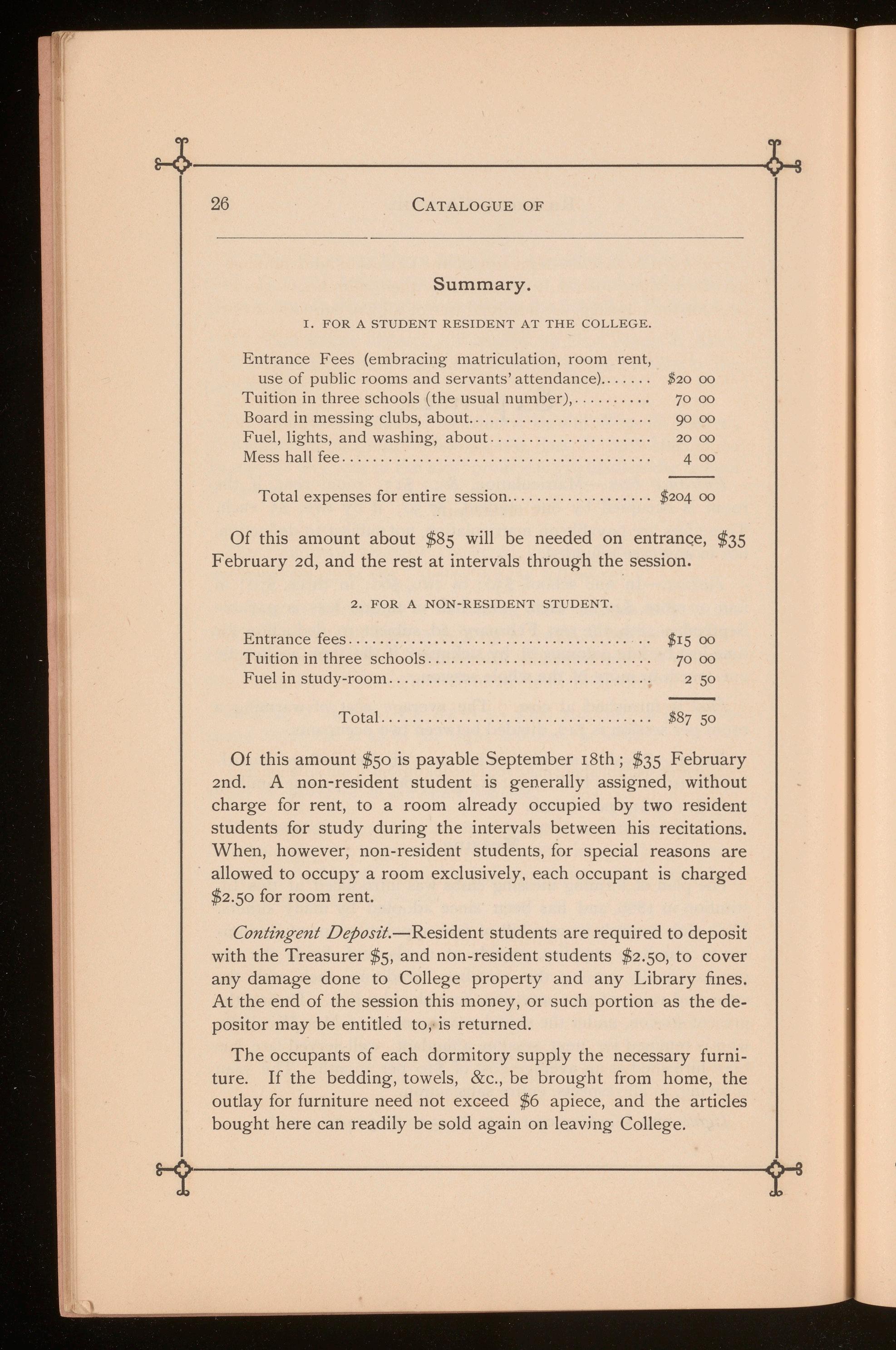
CATALOGUE OF Summary.
I. FOR A STUDENT RESIDENT AT THE COLLEGE.
Entrance Fees (embracing matriculation, room rent, use of public rooms and servants' attendance)... . . $20 oo
Tuition in three schools (the usual number),.......... 70 oo
Board in messing clubs, about....
Fuel, lights, and washing, about.
Mess hall fee. .
Total expenses for entire session ...................
Of this amount about $85 will be needed on entranc;e, '$35 February 2d, and the rest at intervals through the session.
2. FOR A NON-RESIDENT STUDENT.
Entrance fees.
Of this amount $50 is payable September 18th; $35 February 2nd. A non-resident student is generally assigned, without charge for rent, to a room already occupied by two resident students for study during the intervals between his recitations. When, however, non-resident students, for special reasons are allowed to occupy a room exclusively, each occupant is charged $2.50 for room rent.
Contingent Deposit.-Resident students are required to deposit with the Treasurer $5, and non-resident students $2.50, to cover any damage done to College property and any Library fines. At the end of the session this money, or such portion as the depositor may be entitled to, is returned.
The occupants of each dormitory supply the necessary furniture. If the bedding, towels, &c., be brought from home, the outlay for furniture need not exceed $6 apiece, and the articles bought here can readily be sold again on leaving College.

Privileged Students.-Ministers of the Gospel of all denominations, and young men duly approved by their churches as candidates for the ministry, are admitted free of all College fees except a charge of $10 for matriculation and servants' attendance, and if they board in the messing club a fee of $4 for rent of Mess Hall. The Education Board of the Virginia Baptist General Association, located in Richmond, but in no other way connected with the College, will render further assistance to young men recommended to them and accepted after examination.
The College has had for several years three endowed scholarships, as follows :
First. Two Memorial Scholarships, raised by the Baptists of Virginia in 1876, the income from which is devoted to the payment of the tuition, in whole or in part, of such Baptist ministers' sons as may need help in this direction.
Second. The First Baptist Church (Richmond) Memorial Scholarship, established in 1876, for the tuition of any beneficiary the church may select.
In addition to these, and under the generous proposition of Hon. Geo. A. Woolverton, of Albany, New York, a fund of $10,000is being raised for kindred purposes.
On the last day of the session the closing exercises are held in public, when the results of the examinations are announced, certificates and diplomas awarded, and addresses delivered by the Bachelors and Masters of Arts. ·
The order of announcement and delivery of honors is as follows:
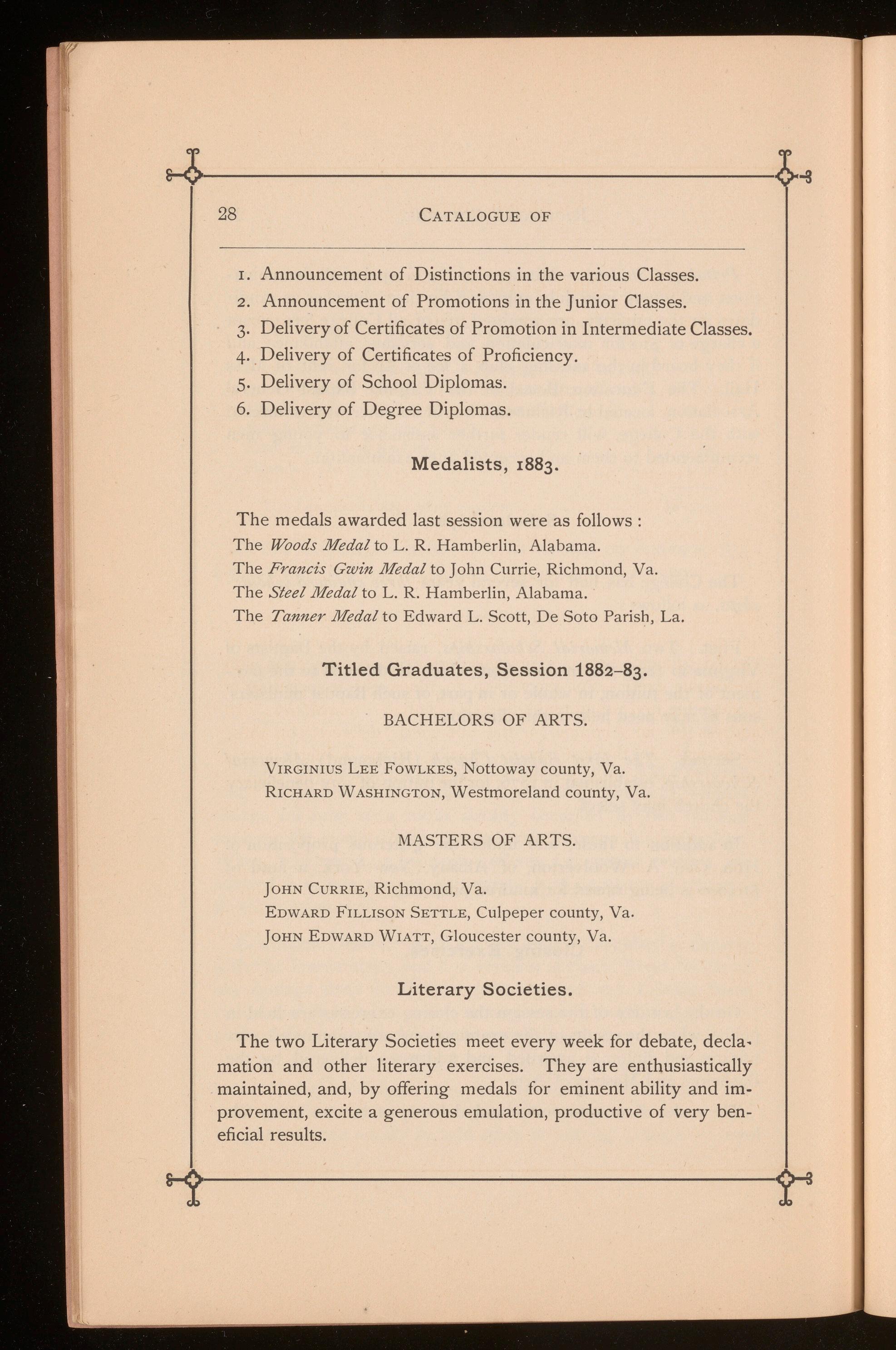
CATALOGUE OF
1. Announcement of Distinctions in the various Classes.
2. Announcement of Promotions in the Junior Cla~ses.
3. Delivery of Certificates of Promotion in Intermediate Classes.
4. Delivery of Certificates of Proficiency.
5. Delivery of School Diplomas.
6. Delivery of Degree Diplomas.
Medalists, 1883.
The medals awarded last session were as follows :
The Woods Medal to L. R. Hamberlin, Alabama.
The Francis Gwin Medal to John Currie, Richmond, Va.
The Steel Medal to L. R. Hamberlin, Alabama.
The Tanner Medal to Edward L. Scott, De Soto Parish, La.
Titled Graduates, Session 1882-83.
BACHELORS OF ARTS.
VIRGINIUSLEE FOWLKES,Nottoway county, Va.
RICHARDWASHINGTON,Westmoreland county, Va.
MASTERS OF ARTS.
JOHN CURRIE, Richmond, Va.
EDWARDFrLLISON SETTLE, Culpeper county, Va.
JOHN EDWARDWIATT, Gloucester county, Va.
Literary Societies.
The two Literary Societies meet every week for debate, decla• mation and other literary exercises. They are enthusiastically maintained, and, by offering medals for eminent ability and improvement, excite a generous emulation, productive of very beneficial results.

RICHMOND COLLEGE. 29
Final Celebration, 1883.
MU SIGMA RHO SOCIETY. PHILOLOGIAN SOCIETY. MEDALISTS. MEDALISTS.
F. F. Fowler, E. B. Pollard, Best Debator. Geo. W. Quick, Improvement. W.W. Hurt, Best Debator. Improvement. ORATOR. ORATOR.
Thos. J. Shipman, Richmond, Va. M. L. Wood, Pittsylvania Co.
VALEDICTORIAN. SALUTATORIAN.
L. R. Hamberlin, Alabama. Geo. W. Hurt, Powhatan Co.
Consists of those who have received any of the College degrees, and such other former students as may be, for distinguished merit, elected to membership. They meet annually in connection with the closing exercises of the session, to renew the associations of College life, and promote the interests of their Alma Mater. An address by an Alumnus of the College is delivered on these occasions. At the last annual meeting of the Society it was agreed to raise a fund for the endowment of one of the schools of the College.
Orator for I884.-SAMUEL B. WITT, EsQ., Richmond.
President: ASHTON STARKE, Richmond, Va.; First Vice-President: J. R. BAGBY, Powhatan Co., Va.; Second Vice-President: C. F. JAMES, Culpeper Co., Va.; Third Vice-President: JAMES LYONS, JR., Richmond; Secretary: G. HARVEY CLARKE, Richmond; Treasurer: Dr. CHAS. L. STEEL, Richmond.
Executive Committee.-R. R. GwATHMEY, C. V. MEREDITH, ROLFE E. GLOVER, CHAS. M. SHIELDS, JOHN CURRIE.
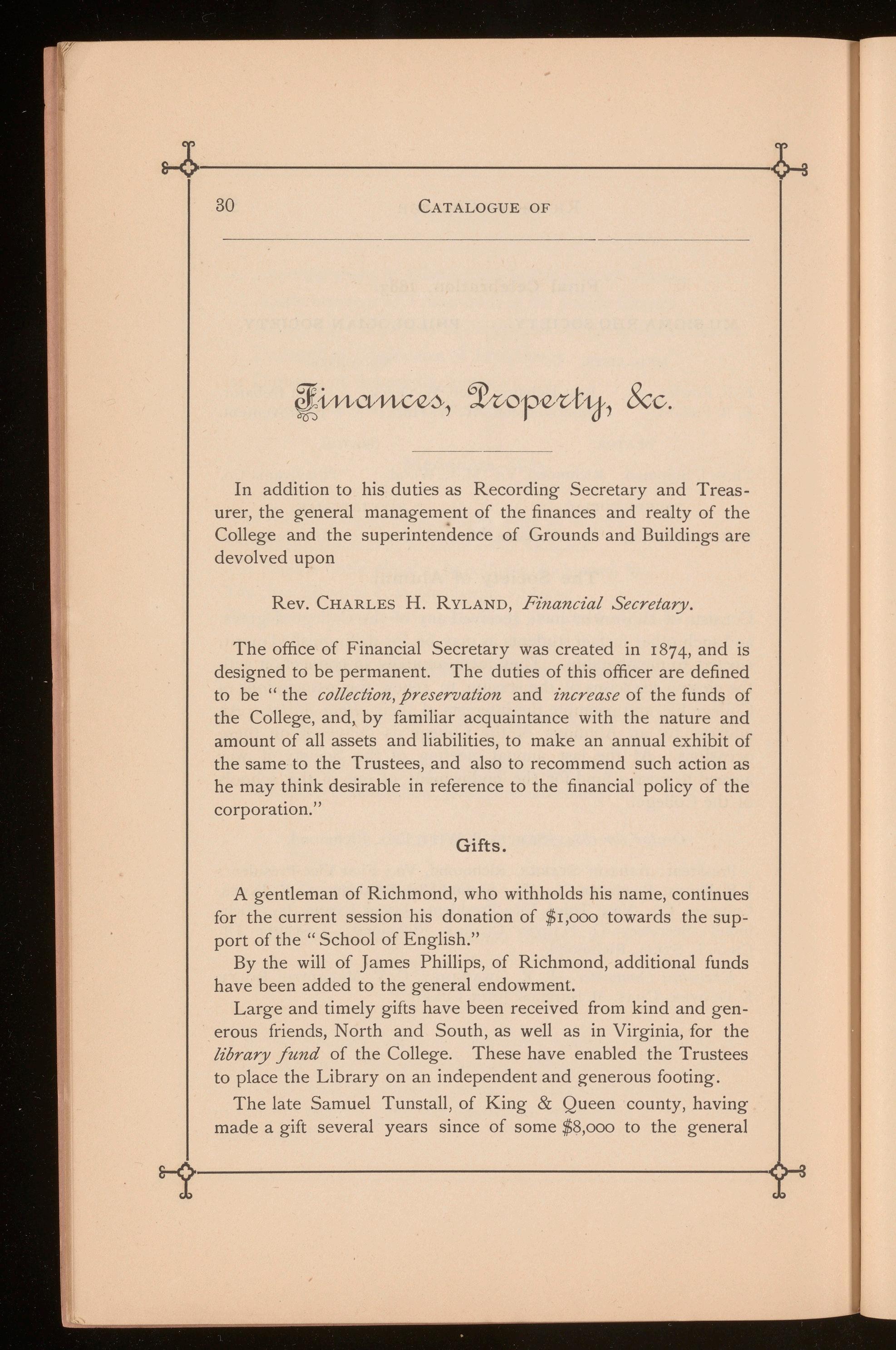
In addition to his duties as Recording Secretary and Treasurer, the general management of the finances and realty of the College and the superintendence of Grounds and Buildings are devolved upon
Rev. CHARLES H. RYLAND, Financial Secretary.
The office of Financial Secretary was created in 1874, and is designed to be permanent. The duties of this officer are defined to be " the collection, preservation and increase of the funds of the College, and, by familiar acquaintance with the nature and amount of all assets and liabilities, to make an annual exhibit of the same to the Trustees, and also to recommend such action as he may think desirable in reference to the financial policy of the corporation.''
Gifts.
A gentleman of Richmond, who withholds his name, continues for the current session his donation of $1,000 towards the support of the "School of English."
By the will of James Phillips, of Richmond, additional funds have been added to the general endowment.
Large and timely gifts have been received from kind and generous friends, North and South, as well as in Virginia, for the library fund of the College. These have enabled the Trustees to place the Library on an independent and generous footing.
The late Samuel Tunstall, of King & Queen county, having made a gift several years since of some $8,000 to the general

funds of the College, it is ordered by the Trustees that the bequest shall be known and published annually as
THE TUNSTALL FOUNDATION.
These funds have been judiciously invested, and will be held sacred to endowment purposes, the interest only to be used.
Richmond College needs and invites bequests both to her special and general funds. The Trustees desire to increase the number of scholarships in the College. A comparatively small sum of money, well secured, devoted to purposes of this character, may be useful for long years in affording tuition, books, &c., to needy young men.
The endowment of the various Schools opens a yet wider range for liberality. By reference to the preceding pages of this Catalogue, it will be noticed that each "School," such as English, Greek, or Mathematics, is independent. Consequently, donations may be specifically applied to the endowment •of some favorite branch of learning.
In every case, unless objection be made, the name o.f the donor will be given to the f1md so created, whether it be a school or a scholarship. By this means the names of those who aid learning will be perpetually remembered.
Apart from these special objects, the general endowment funds of the College need greatly increased help. No institution of the grade and scope of this College can do its work successfully without a safe as well as a broad foundation. It must be removed to a certain extent from the recurrence of general financial depression and consequent fluctuations in patronage. A steady and growmg mcome alone can give it integrity, permanence and progress.
The legal title of the corporation 1s simply "Richmond College."
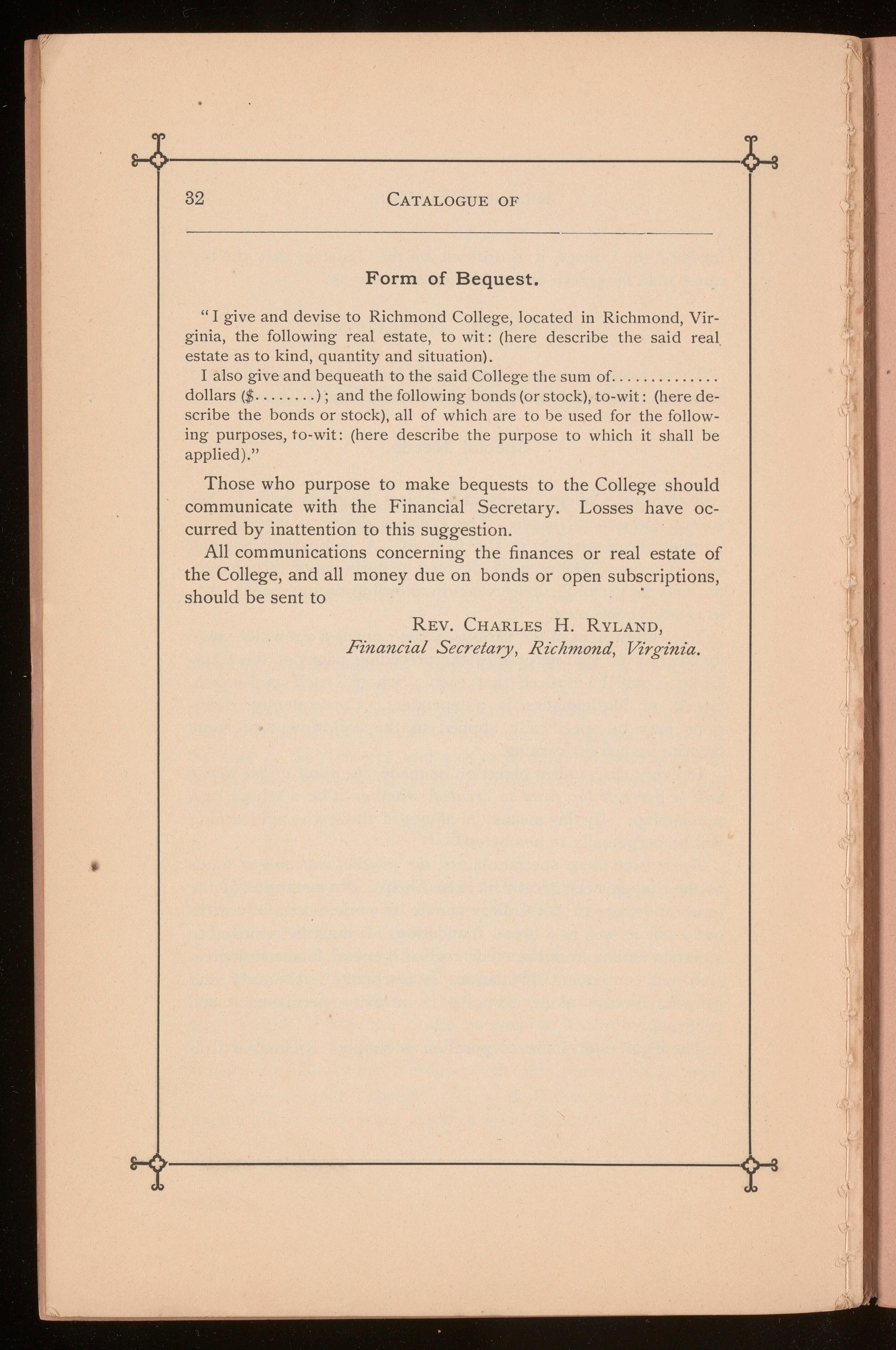
OF
"I give and devise to Richmond College, located in Richmond, Virginia, the following real estate, to wit: (here d e scribe th e said real estate as to kind, quantity and situation).
I also give and bequeath to the said Colleg e the sum of. dollars ($..... .. ) ; and the following bonds (or stock), to-wit: (he re describe the bonds or stock), all of which are to be used for the following purposes, to-wit: (here describe the purpose to which it shall be applied)."
Those who purpose to make bequests to the College should communicate with the Financial Secretary. Losses have occurred by inattention to this suggestion.
All communications concerning the finances or real estate of the College, and all money due on bonds or open subscriptions, should be sent to ·
REV CHARLES H. RYLAND, Financial S ecretary, Richmond, Virginia.

